SOAS SPIRIT
YOUR INDEPENDENT STUDENT NEWSPAPER

SHEPHERDS BUSH MARKET GENTRIFICATION THREAT INTENSIFIES

BOYCOTTS: YOUR POWER, YOUR PURSE, OUR LIBERATION

ARE THE MOBOS REWARDING THE THEFT AND MISUSE OF BLACK CULTURE?

YOUR INDEPENDENT STUDENT NEWSPAPER

SHEPHERDS BUSH MARKET GENTRIFICATION THREAT INTENSIFIES

BOYCOTTS: YOUR POWER, YOUR PURSE, OUR LIBERATION

ARE THE MOBOS REWARDING THE THEFT AND MISUSE OF BLACK CULTURE?
 Barty Roberts, BA Politics and International Relations
Barty Roberts, BA Politics and International Relations
At the end of 2023, Palestine Solidarity UK reported that SOAS had invested more than £2 million in companies which they describe as complicit in Israeli apartheid.
The SOAS Spirit asked SOAS to confirm if this was true and if so, what their justification was for doing so. They provided us with the following statement:
“We are committed to maintaining a university investment portfolio that is one of the most ethical in the UK. The SOAS community is rightly concerned about the arms trade and abuses of human rights, and these concerns are enshrined in our ethical investments policy. We welcome questions about our investments to help us maintain our high ethical
standards. The committee regularly reviews our portfolio to ensure investments meet our principle-based approach to ethical investing.”
This refusal to deny these reported investments is as good as a confirmation. SOAS’ investment policy is available to read online and outlines various ethical commitments, including that, “SOAS follows a principle-based approach to ethical investing and the policy reflects SOAS’ concerns with human rights, armaments, gambling and tobacco.” These “concerns” are somewhat facile, considering how easily they have been ignored. The policy was last revised in June 2015 - despite the fact that the committee “regularly reviews” its portfolio.
The SOAS Palestine Society is one of the most well-supported societies within the Students’ Union and regularly expresses its opposition to the Israeli regime. These investments seem directly at odds with the values of the SOAS community. At the start of 2024, several SOAS staff were involved in a trade-union-led protest blockading an Arms Producer that supplies the Israeli Defence Forces - another demonstration of the SOAS community and its values being ignored by SOAS management and its investment behaviour.
Commentary on page 11 (see Opinion piece)
Suspended Students Return to Campus
Shepherds Bush Market Gentrification Threat Intensifies
Maternal Death Rates at a 20-Year High
Niger Coup: Tentative Hope
p7

Dear Spirit readers,
SOAS’ Confused Management
Strike a Pose: The Manipulation of Black Models
Main Character Syndrome
Show me the money, not the misogyny
I’m Going Back to 505... or 2014?
The Spirit of the New Year
p11
Pay Me What You Owe Me!
Are the MOBOs Rewarding the Theft and Misuse of Black Culture?
African Joy: A Celebration Beyond Football
SOAS Spirit Society Spotlight: The Writers Society
p23
I hope you’ve all had a very relaxing break after a considerably rainy term one. Going into term two, I’m always very excited to have deadlines out of the way and new modules to look forward to. Upsettingly, I have already applied for mitigating circumstances twice, so I’m sure I’ll be looking and feeling a lot less lacklustre after reading week.
On the upside, in Issue 27 we have a fascinating range of articles for you to enjoy. In National News, Archie Thomas has done an incredible job of putting together a section that addresses some really hard-hitting local stories. Similarly, Ami AbdiqadirMohamed has collated some brilliant articles on topics such as Misogynoir, Saturday Night Live, and sustainable shopping, for the Culture section. We also have some particularly important questions raised in SOAS News by Barty Roberts about the integrity of our university and Students’ Union, alongside two incredibly important articles from our Senior Foreign Affairs Editor Amelia Casey-Rerhaye.
We were really pleased to see so many new faces at the pitch
meeting in week one, and then at our very exciting new Newsroom in week two. Thank you to everyone who came along to those events and supported us. We’re really grateful that so many of you keep coming back and continue to write wonderful content for us!
Some of my personal favourite articles from this issue include Anon Yu Henriksen’s very entertaining piece on performative cleanliness for our Features section, as well as the fascinating interview done by our Editor-at-Large Jacob Winter for his new column. Kristi Greenwood’s ‘Main Character Syndrome’ led to some serious introspection, as did Ami Abdiqadir-Mohamed’s piece on boycotting really made me think about how I choose to spend my money. I’m also a big fan of Ayra Khan’s Sports and Societies section in this issue and would really recommend that you check it out.
I must also encourage everyone to take a look at our Digital Exclusive articles for Issue 27. I loved reading the article that Gabriel Mullins has written for our Culture section about Emahoy Tsege-Mariam Gebru and their album Souvenirs, as well as Roxanna Brealey’s fascinating discussion about whether beauty is truly in the eye of the beholder.
Once again, the wonderful Spirit team deserves endless thanks for their hard work on this issue. In particular, I must thank our new Social Events Coordinator (also our Features Editor) Anisah Mahamoud, who is a true lifesaver, as well as the wonderful Sarah Cotte (also one of our dedicated Contributing Designers) who has spent hours designing and drawing our beautiful portraits for the paper.
The time and energy spent putting this paper together really shows, and I couldn’t be more proud to be part of the Spirit team. I hope you love the paper as much as we do.
Lulu Goad Editor-in-Chief
Clayton Barrington-Russell Managing Editor
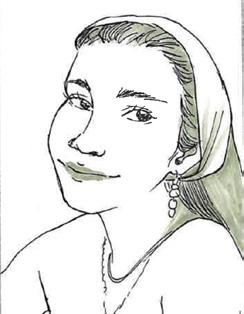
Amelia Casey-Rerhaye Senior Foreign Affairs

Jacob Winter Editor-at-Large

Amy Kan Creative Director
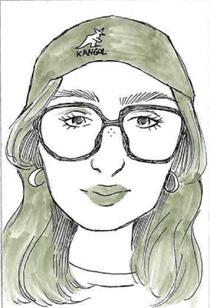
Eman Baasti Senior Sub-Editor

Sanna Hamid Executive Digital Editor
Cotte • Contributing Designer
Anna Draperi • Contributing Designer
Amber Hamed • Contributing Designer
Tamara El-Halawani • Sub-Editor
Sam Landis • Sub-Editor
Laura Steurer • Sub-Editor
Amelia Casey-Rerhaye • Sub-Editor
Mahin Patel • Digital Reporter
Hiba Ul-Hasan • Digital Reporter
Aditya Mishra • Digital Reporter
Ayra Khan • Digital Reporter
https://soasspirit.co.uk/category/news/
News Editors: Barty Roberts, Archie Thomas, Leticia Chen



The SOAS Students’ Union continues to face criticism over its failure to act upon allegations against the Co-President for Welfare and Campaigns - Sushant Singh. Following the 2023 Students’ Union Annual General Meeting (AGM), a motion was passed against Mr Singh that led to an independent investigation into these allegations, which has come back inconclusive. Following this, there was supposed to be a referendum in which students could vote to remove him simply based on there having been allegations made against him; a referendum which never occurred. This year, Mr Singh will either stand for re-election or will cease to be a Co-President, with no disciplinary action having been taken against him or the option for students to have him removed from his post.
During the Annual General Meeting on June 2nd 2023, a no-confidence motion was made against Mr Singh by Matthew Zimmer and Viktor Uteng da Silva. The reasons for the submission of the motion included sexual harassment allegations,
failure to fulfil election pledges, and acting beyond one’s brief and public affiliations with the Bharatiya Janata Party (BJP). The Bharatiya Janata Party, commonly abbreviated to BJP, is a party that promotes Hindutva, a Hindu nationalist and notably Islamophobic ideology.
At the recent Suspended Students Spill the Tea event, where students who were falsely suspended over activism for Palestine spoke about their experience and their issues with both the university administration and the Student Union more broadly. The SOAS Solidarity Instagram page, known for its connection to both the students who put forward the motion to investigate Sushant but also had several of its own suspended in October, wrote in the post’s caption: “Welfare and campaign support where?” ‘Welfare’ and ‘campaigns’ are meant to be the official briefs of Sushant as Co-President of the SU.
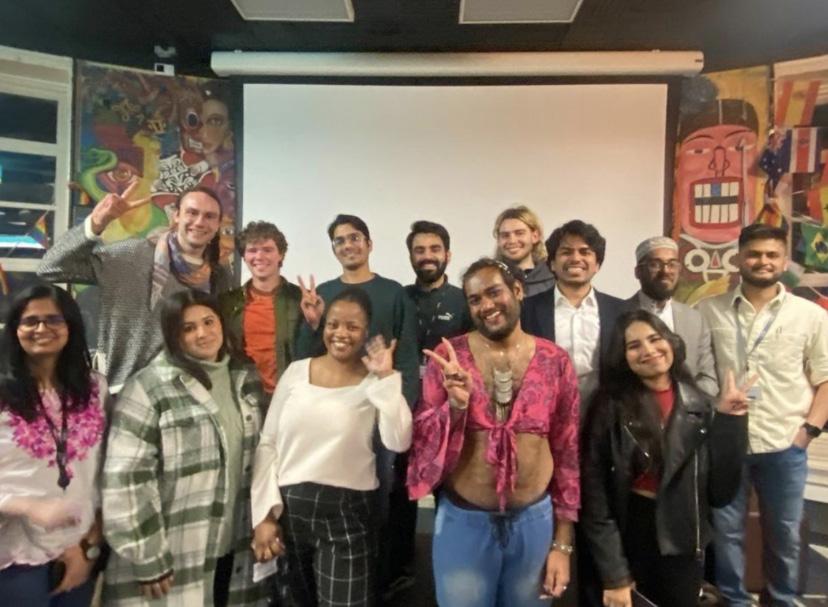
On October 9th 2023, the SOAS Palestine Society conducted a protest on the steps of SOAS, holding a banner to protest the University’s affiliation with Zionist groups. The disabled ramp was left unobstructed, and students were able to get in and out of the building without much disruption. A fire alarm then sounded and in response, security guards ordered the protesters off the steps. Within a minute they had moved, relocating to the green between Senate House and the Brunei Gallery. Security elected to close the main door, the only known entrance to most students, leaving hundreds of students to be herded through a singular door.
By October 13th, four students had been suspended, and warnings were issued to several members of the society. Some of the students who received warnings were not present at the protest nor involved in the organisation of it. One student was not even in the country at the time.
One of the suspended students there was Matthew, an international student who completed their MA at SOAS recently. While they knew that there had been tensions between student protestors and the administration at SOAS, they claimed the reaction of management was unprecedented.
Matthew relays that it is hard to keep seeing individuals who were personally involved in the case against them. Namely, Cornelius Potgieter, the head of security who made the initial complaint, as well as members of the Students’ Union.
Matthew states that the official reasons for their suspension were for violating health and safety policy and an agreement
“The investigation was delayed longer than necessary to the point where the students missed an entire term. SOAS did not provide any support either internally nor provided sources for the students to seek help and advice.”
between the SU and management. The policy of disallowing protests on the steps was and remains unknown to many students. Matthew recalls protesting on the steps last academic year with no warning or repercussions.
During the initial speculation around who had pulled the fire alarm, the President of the Palestine Society received a warning, despite claims that they hadn’t been involved. These claims were confirmed by the investigation. Over the course of their suspension, Matthew claims that SOAS failed to update them every ten days - a requirement of SOAS disciplinary policy. The suspended students received sporadic communication from SOAS and what little communication they did receive did not detail any developments regarding their cases. Appeals were rejected and they were told that the presence of the students on campus would jeopardise the investigation.
The investigation was delayed to the extent that suspended students missed an entire term. SOAS did not provide any support either internally or allow the students access to sources to seek help and advice. They did not receive any help from the Students’ Union and Matthew believes that the SU failed to
fight for the reinstatement of the students.
Matthew said the Co-President who did help push for support for the suspended students was Reem Walid, the Co-President for Democracy and Education. A student and staff petition calling for their reinstatement received over 300 signatures.
Another student impacted by the suspensions was Alex. Alex was not suspended but received what they suggest was a warning that falls into an unenforceable ‘grey area’. SOAS alleged that Alex was responsible for organising and leading the protest. The warnings issued were emphasised by SOAS as non-official, and would not appear on records, but insisted they had to be followed. Alex was unable to appeal the warning due to it being unofficial.
Adam Habib, SOAS Director, responded to the staff petition by stating that the students were a threat to the SOAS community, a claim that was corroborated by an anonymous professor. This came despite the multiple petitions signed by staff and students in support of the suspended alumni, many students relayed that they do not and have never felt unsafe on campus as a result of any protests and posited that most of the harassment they faced is from security. Similar to Matthew, Alex doesn’t feel like the Students’ Union helped at all. They said the SU functioned more like a band-aid designed to placate students and leave the root of the problem unsolved. They were told to follow the complaints process and were turned away.
 Jacob Delos Santos, MA Global Media and Digital Communications
Jacob Delos Santos, MA Global Media and Digital Communications
In January, victims of what has been described as the “biggest miscarriage of justice in UK history” reemerged in the British media, once more demanding legal reparations in response to the Post Office Horizon scandal.
Since 2000, the UK’s Post Office has been bringing convictions against workers with counts of fraud, theft, and false accounting. More than 900 subpostmasters across the country have been wrongly prosecuted after the Post Office’s ‘Horizon’ software, developed by the Japanese technology service Fujitsu, incorrectly claimed that money was missing during financial branch reports.
Over the course of 15 years, the Post Office scandal has left a wake of devastation, with hundreds of victims subjected to criminal records, community service, and, in certain cases, jail time.
The scandal has once again hit national headlines following the new year’s airing of ITV’s ‘Mr Bates vs The Post Office’, a four-episode series highlighting personal stories suffered at the hands of Fujitsu’s faulty software. Former subpostmaster Alan Bates, the titular actor of the viral ITV drama, appeared before the Commons’ Business and Trade Committee on January 16th.
The 69-year-old had criticised the government for delays in
financial compensation for those wrongly convicted. “There is no reason at all why full financial redress shouldn’t have been delivered by now,” he states. “It just seems to be tied up in bureaucracy. And that seems to be the big problem.”
Solicitor Neil Hudgell has warned the Business and Trade Committee that overturning convictions is taking “three to four months,” and that “within the convicted cohort of clients that we have, of the 73, three have been fully paid out.” Additionally, more than 100 new potential victims of the scandal have come forward, prompted by the media coverage of Mr Bates’ litigation.
Since the contemporary fallout of the ITV programme, MPs have faced growing public pressures to expedite such appeals. Prime Minister Rishi Sunak has thus announced plans early in January to pass a new law which would exonerate and financially compensate wrongly convicted postmasters. In a BBC interview with Laura Kuenssberg, Sunak called the scandal an “appalling miscarriage of justice.”
As of January 17th, Fujitsu’s European chief Paul Patterson, had testified before the business select committee that the company was aware of Horizon bugs as early as the 1990’s. According to The Guardian, the company had continued in the prosecutions of 900 innocent post office operators, despite the acknowledgement of faulty data.
“… the Post Office scandal has left a wake of devastation, with hundreds of victims subjected to criminal records, community service, and, in certain cases, jail time.”
Patterson apologised before MPs, stating that Fujitsu is “truly sorry,” admitting that “there is a moral obligation for the company to contribute” to the redress of all scandal victims. However, Patterson concludes that the exact sum of compensation will only be determined after a holistic investigation can be completed by a judge-led inquiry, with pundits predicting such reports to finalise as late as 2026.
Just hours after Patterson’s formal apology, the company’s shares had crashed by 4%, with Fujitsu’s stock market value plummeting by $1 billion. Additionally, the company is also currently suffering an internal workers strike of up to 300 staff. Paula Vennells, the previous CEO of the UK’s Post Office, has also since agreed to renounce her CBE, in response to nationwide petitions calling for her accountability.
On the 20th of December, Hammersmith and Fulham council voted, by three votes to two, to approve the redevelopment of Shepherd’s Bush Market in what campaigners have called “a shameful decision to side with corporate greed.”
The planned development includes a nine-story building including offices, flats, and a life sciences incubator for Imperial College London, in addition to the refurbishment of existing market stalls. Yoo Capital, the majority owners of the market, said: “We are very pleased that plans for Shepherd’s Bush Market have been approved. This begins an important new chapter for the traders and market stallholders who have served the community, residents, tourists, and visitors for generations. The approved vision combines the efforts of local stakeholders, the community, and Yoo Capital, to create a long-term and successful future for all.”
Community campaign group Protest Shepherds Bush Market condemned the decision in a statement on X, writing: “The council have sided with the developer and ignored community and trader concerns for 18 months. Tonight just 3 councillors voted to approve an application that will push out traders and destroy the market’s diversity and character. We will continue to fight this application and the rampant gentrification it represents.”
In addition, more than 30 traders from the West London market have written to the council to express concern about the proposed development. The Hammersmith and Fulham Planning and Development Control Committee disclosed that 126 objections have been made to the proposal and 103 submissions in support.
A previous meeting of the planning committee was forced to be abandoned when 20 campaigners protested claiming the council had not engaged with the community and that: “The planning process [was] devoid of democracy and [the]

decision [had] been rigged from the start.” Many traders were also refused entry to the public meeting.
These campaigns are now focused on urging London Mayor Sadiq Khan to ‘call in’ the planning decision and block the development from proceeding. The Mayor has the power to review and block all major developments in the capital.
In July last year, Sadiq Khan reviewed plans to build a tower block over Brixton Market in South London after pressure from local campaign group Fight the Tower. Developer Hondo Enterprises subsequently withdrew their planning application.
The UK Government’s heritage advisor Historic England has also expressed concerns that the development would be “visually dominant” and harmful to the character of the Shepherd’s Bush Conservation Area.
“‘We will continue to fight this application and the rampant gentrification it represents.’”
Speaking to The SOAS Spirit, campaigner Jake Simms explained that the concern for Protect Shepherd’s Bush Market is that the “reason behind attempts to redevelop is to increase the value of the market as an asset and the main mechanism to do that is to massively increase rents for traders.” Yoo Capital says they have offered traders rent freezes till 2031. Simms told us there would be no guarantee of protected leases or affordable rents after this and that this “would completely transform the character of the market. There would still be a market but it would be massively gentrified.”
Trigger warning: Mentions of suicide
Maternal death rates are currently at a twenty-year high according to a report by Mothers and Babies: Reducing Risk through Audit and Confidential Enquiries (MBRRACE-UK). Figures from this report provide new and alarming information. From data collected between 2020-22, the maternal death rate was 13.41 per 100,000 births and with the exclusion of COVID cases, the maternal death rate was 11.54 per 100,000 births.
“Whilst this data is shocking, the inequalities are not new ”
This marks a stark increase from 2017-19 figures of 8.79 per 100,000 births. While the issue of the maternal death rate has always been a concern for health officials, recent statements have been released regarding the matter. An NHS England
spokesperson stated: “While the NHS has made significant improvements to the maternity services over the last decade, we know further action is needed to improve the experiences of women and their families across the country.” This statement has been released after significant funding for maternal care in the NHS has been increased on two occasions. In 2021 £95.5 million extra was given to maternity services in response to the Ockenden report which gave recommendations on how to make maternity services safer. Additionally, in 2022, an extra £127 million was used to fund maternal services in the UK.
The report from MBRRACE-UK, an organisation that studies the risks of pregnancy and birth, provides further information into the direct and indirect causes of maternal death from 2020-22. The most significant direct causes of death were thrombosis and thromboembolism, as well as suicide. Suicide was recorded up to six weeks after birth. Indirect causes of maternal death include, most significantly, COVID-19, followed by cardiac and neurological diseases.
The data collected can be further broken down to see how
maternal death impacts certain demographics. For Black women, the maternal death rate is three times higher than for white women, and for Asian women, it is two times higher. Women giving birth in deprived areas experience maternal mortality more than two times higher than those living in the least deprived areas. Whilst this data is shocking, the inequalities are not new. Dr Nicola Vousden, a clinical research fellow in Maternal and Child Population Health, has expressed that these disparities are caused by “underlying structures that impact health before, during and after pregnancy, such as housing, education and access to health environments.”
There are campaigns across the UK such as the #blackmaternalhealthdebate, supported by MP Zarah Sultana, that aim to address disparities amongst the Black community. A report published in April 2023, by the House of Commons Women and Equalities Committee suggested that racial bias against Black women played a key role in the disproportionate death rate, as doctors were more likely to underestimate the pain they experienced.
This year more than 40 countries, representing over 40% of the world’s population, will be holding national elections. Labelled by many as a “Super Bowl”, it is a record-breaking election year, with the ballot box battles poised to incur geopolitical and economic impacts around the world.
From the United Kingdom to India, Russia to Taiwan, the presidential contests will have large implications for economies, human rights, international relations and the likelihood of peace in an already unstable setting.
In some countries, the balloting will be free and open, while in others, limitations on opposition candidates and the potential for manipulation of results will threaten democracy.
There’s one thing for certain: a rerun between President Joe Biden and his predecessor Donald Trump for the Presidency of the United States looms large in the autumn election calendar. With the US involved in military assistance, funding and/ or sourcing army personnel to so many areas of the world, including Ukraine and Gaza, a Trump victory is a large global wildcard.
The possibility of the Republican Trump returning to office, with his “America First” foreign policy agenda, adds additional uncertainty. The fate of the Russia-Ukraine war also, arguably, depends on the outcome of the election, with fears that he would not push for negotiations that favour the Ukrainian population.
The first election of 2024 took place in Taiwan on January 13th, with China’s least preferred candidate, Lai Ching-te of the Democratic Progressive Party (DPP), winning the highly pressured vote.
Whilst Lai has not indicated a desire to declare Taiwan’s independence, the presidential win is expected to heighten cross-strait tensions. Prior to the win, Beijing described the elections as a choice between war and peace. With Lai’s promises to strengthen Taiwan’s defences, Beijing vowed that the
win “will not impede the inevitable trend of China’s reunification.”
Tunisian President Kais Saied will seek re-election in November, an election likely to be guided by questions about migration and the country’s economic crisis. Tunisia, a country in the Maghreb region, was previously praised as being the only genuine, successful democracy to follow the upheaval of the Arab Spring.
However, on July 25th 2021, Saied sacked the government, freezing parliament before dissolving it entirely and pushing through a new constitution, which granted him almost unlimited authority.
In January 2023, only 11.3% of Tunisia’s nearly eight million eligible voters turned out for parliamentary elections in a rejection of Saied’s reforms.
It is expected that Saied will be re-elected, given his almost absolute power and his leading opposition candidate Rached Ghannouchi currently serving time in jail on charges which observers say are politically motivated. This may result in public discontent and further strikes and protests across the nation.
India, the world’s most populous country, is due to hold an election by mid-2024. The results are likely to bring Prime Minister Narendra Modi of the right-wing Hindu nationalist Bharatiya Janata Party (BJP), a third consecutive term.
Modi’s supporters see him as an outsider in the political landscape, who has cleaned up after decades of corruption and established India as an emerging global power. His critics say attacks on the press, free speech, and religious minorities have only become more rampant since his leadership.
There is little doubt about who will win Russia’s election in March. President Vladimir Putin faces re-election for a fifth term, having already been in power for 24 years. Recently a Russian politician, former regional legislator Yekaterina Duntsova, was disqualified from running for president after calling for peace in Ukraine.
The South Korean parliament officially put forth legislation that bans all trade of dog meat on 9th January. The ban prohibits all sales of dog meat within the country as well as banning all farming and production of dog meat.
The decision has been highly anticipated since the proposal of the bill on November 17th. The topic of banning dog meat has been brought up frequently within the political sphere for many years.
Violating this law can now earn criminals up to three years in prison or up to ₩ 30m in fines. Action will take place in six months time, with phase-out lasting three years, making the consumption illegal by 2027.
The Animal Protection Act has prohibited brutal farming methods against animals in general for many years. The dog meat industry has been particularly under-regulated, as dogs are not classified as “livestock”. Dogs were not protected under the Livestock Processing Act, which has resulted in the longlasting inhumane slaughter of dogs.
South Korea’s dog farming industry and consumer base are extremely limited in East Asia. “94% of South Koreans hadn’t consumed dog meat within the last year,” Seoul’s Thinktank Animal Welfare Awareness showed.
Marriage and birth rates in the country are getting lower, and consequently, the choice of having pets such as dogs has become increasingly popular in recent years, with six million dog owners in Korea by 2022.

Throughout 2023, following the COVID-19 pandemic and its restrictions, along with migration concerns and inflation taking a grip around the world, there seems to be a shift in Europe to the Right, with the rise of right-wing coalitions with far-right parties. This could be a continuing trend in 2024, with implications for human rights laws and protections.
Federal elections are due to be held in Belgium on June 9th with the country’s far-right Vlaams Belang party, directly translating to ‘Flemish Interest’, as the biggest current political force. There has been a clear increase in support for the farright, anti-immigration party, which comes in response to an increase in concern for migration amongst voters in Flanders.
A far-right surge in the region, to match that of the neighbouring Netherlands, remains a highly possible scenario. Geert Wilders led a surprise victory with his anti-EU party in the Dutch elections in November 2023.
Will 2024 mark the end of Tory power?
A question sure to be asked again and again this year is whether 2024 will mark the end of the Conservative’s 14-year residence at 10 Downing Street. It appears increasingly likely, with the centre-left Labour Party and its current leader and former humanitarian lawyer, Sir Keir Starmer firmly ahead in the opinion polls. Expectations for a Labour leadership largely include a ‘fresh start’ and an improvement in public services, as well as a repeal of the controversial Rwanda policy.
Dog meat has become an unpopular and niche food, often eaten by individuals believing it has health benefits, with products such as “gaesoju” a dog-based medicinal alcohol.
Farmers of dog meat protested on numerous occasions since discussions of the ban, including the Korea Dog Meat Farmers’ Association protested outside the presidential office.
1,150 farms were still run by 2023 for the dog meat industry. This ban posed severe threats to their livelihoods.
The Dog Meat Federation requested ₩ 2m in compensation per dog as well as compensation for farming facilities and increasing the grace period to 10 years.
The Supreme Court is the highest court of appeal in India. Its role is to uphold the law and keep in check both the legislature and the executive in India, hence it is expected to be independent of the influences of the other two pillars of democracy. However, recent events have called into question the reputation of the Indian Supreme Court once again.
In 2004, the Maharashtra High Court ordered eleven convicts to life imprisonment on the charges of rape and murder. The convicts had killed 14 members of Bilkis Bano’s family and had raped her. Bilkis Bano’s family had escaped to the jungle to hide from the violence during the 2002 Gujarat Riots.
Later, in August 2022, the Gujarat Government released the convicts as a part of its remission policy, and it is reported that the Union Home Minister Amit Shah, who himself has a criminal history, had personally played a role in the release of two of those convicts. These eleven convicts were paraded as heroes, and some of them were even seen in the campaigns of BJP election candidates for the Gujarat Elections. The Gujarat Government defended its decision by stating: “Opinions of the concerned authorities have been obtained as per the policy of July 9, 1992, and submitted to the Ministry of Home Affairs, Government of India, vide letter dated June 28, 2022, and sought the approval/suitable orders of India,” the affidavit stated.
The Gujarat government told the Supreme Court that the
Ministry of Home Affairs, Government of India, approved the premature release of the convicts with a letter dated July 11, 2022. On 8th January 2024, the Supreme Court quashed the early release of the convicts following a petition by Bilkis Bano in September 2022 that challenged the Gujarat government’s decision. The Supreme Court labelled the Gujarat Government’s decision ‘a fraud’ and asked the Gujarat Government to send the convicts back to jail within 14 days. However, out of the eleven perpetrators, nine of them went underground and according to multiple media reports, their whereabouts were unknown from 17th January. Last week, on 22nd January, the convicts surrendered at a local jail in Godhra but have asked for more time, according to media reports. They have cited reasons such as impending surgery, marriage in the family, and harvest.
This points to a larger issue faced by the judiciary showing favoritism towards the government. In India, there have been multiple instances where the government plays both hero and villain for the central government, and they have helped the BJP strengthen its communal agenda like the Babri Masjid demolition of 1992. The Supreme Court declared that the demolition of the mosque in 1992 was illegal, but in 2019 granted permission for the Ram Temple to be built in its place. The Court has also given protection to all those who are close to the BJP, like in the case of Gautam Adani. When the Organized Crime and Corruption Reporting Project’s report, alongside the Financial Times and The Guardian, highlighted how the businessman Gautam Adani and his company were involved in malpractices, the Court rejected a
Niger’s unexpected coup d’état on the 26th July saw President Mahomed Bazoum ousted by his former head of security, General Abdourahmane Tiani. Bazoum had been the first president to come to power in a smooth democratic transition, following his own party’s previous leader Mahamadou Issoufou in 2021.
Bazoum’s argent attempts to curb the military’s power and anti-corruption campaign had not endeared him to the country’s military and political elites. His administration saw Niger increase its military cooperation with France and the US with the stationing of a combined force of over 2,000 troops, according to Reuters. This closeness to Niger’s former colonial powers made Bazoum unpopular with the population.
Niger’s coup and subsequent junta follows its Sahel neighbours Mali and Burkina Faso in the past three years by putting pressure on the lingering French military presences in its former colonies to pull out, some of which had been redeployed to Niger.
Niger’s place as a key strategic position in the Sahel region had already led to fears in the EU and US of a rise in Russia’s presence. Such fears have been duly realised with the NigerRussia accord for developing military ties announced on the 16th January.
The coup’s popular support among many Nigeriens exposes
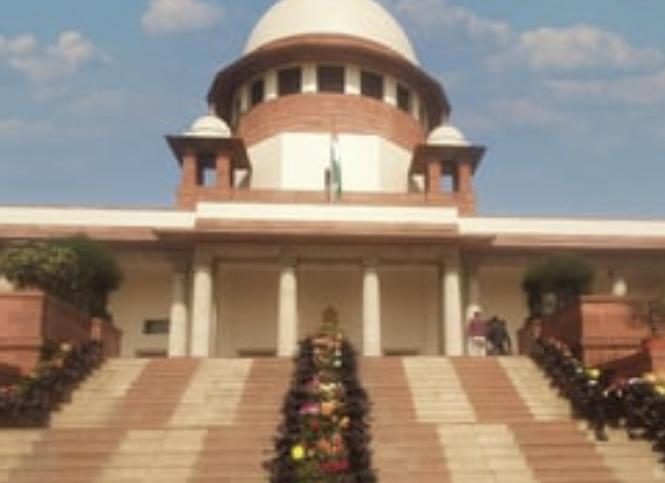
Public Interest Litigation filed against Adani, stating that the report had been published from a third person perspective and is therefore irrelevant. The Supreme Court has also been critical of the mainstream media in its oral remarks, yet when it came to deciding the fate of Aman Chopra of News18 and Sudhir Chaudhary of Aaj Tak, the court didn’t punish them for their crime. Aman Chopra was to be arrested in April 2022 for spreading hateful news, but he has since gone missing. On 11th March 2020, Sudhir Chaudhary was booked for his ‘Jihad Chart’ news, which incited communal hatred against Muslims, yet the Supreme Court let him walk free.
This doesn’t paint a very good picture for the upcoming 2024 General Election. While those who are politically active and look at politics from a religious perspective might benefit, especially the Hindu and the BJP, others have had their perception of what the judiciary stands for shattered. The Supreme Court’s independence from the legislature and the executive remains in question.

a wide disenchantment with the established political classes’ corruption and privileges while Niger’s employment opportunities continue to fall, as well as deep resentment for continued French influence in the region.
Gabon’s own coup on 30th August, just a month after the coup in Niger, saw the end to the Bongo political dynasty and revealed the same rejection of continued French power over its former colonies. The country’s junta leader Brice Clotaire Oligui Nguema recently vetoed the French firm Manuel & Prom’s takeover of Gabon’s domestic oil company Assala Energy on the grounds of Gabon’s sovereignty, according to The Africa Report.
The rejection of French state and corporate power coupled with a strategic alliance with Russia, in the case of Niger, does appear to be a cessation of colonial power in the former
colonies. A recent Guardian piece by Nels Abbey expresses the popular feeling that the recent coups are not “the-run-ofthe-mill coups. Instead, welcomed as legitimate and overdue revolutions against French continu[ing] colonial activity and the ineffective, inept puppets it spawned.”
Moves have been made in forming a new regional grouping, with Niger’s leader Tiani announcing in December the planned economic and political alliance of Niger, Mali, and Burkina Faso as the Alliance of Sahel States (AES), breaking away from the Economic Community of West Africa States (ECOWAS).
The sense of colonial rejection does seem palpable. Whether or not the so-called “overdue revolutions” do bring needed radical change is yet to be seen. For now, we can only hold tentative hope for the realisation of socio-political parity.
With Israel’s invasion and occupation of the Gaza Strip continuing well into its 103rd day (as of the writing of this article), people have continued to take to the streets across the world to protest what is being referred to as a genocide of Palestinians at the hands of the Israeli state. Within regimes supportive of Israel, state repression has been severe, with arrests and public condemnation for anybody seen to be not duly respectful of Israel and its government. In Britain, people have been arrested on both public order violations and for “hate speech”, with the state determining heavy-handedly what qualifies as an antisemitic hate crime and what is legitimate freedom of speech. In Germany, Palestinian prisoner solidarity organisation Samidoun has been banned, while in France protests for Palestine have been banned altogether, despite Emmanuel Macron’s positioning of himself as a “neutral party” in the conflict.
One group of protestors that has faced extraordinary legal and social ramifications for their activism has been those who live within the state of Israel itself. Palestinians who live within the boundaries of 1948 Palestine, recognised internationally as Israel, have always been faced with severe repression for any form of political organisation, which has been exacerbated since October 7th. Arab Israelis who held “unauthorised” protests in Haifa were arrested, with chief of police Kobi Shabtai claiming that: “Anyone who wants to identify with Gaza is welcome - I will put them on buses that will send them there.” A newer phenomenon has been strict repression of Jewish Israeli citizens who have been protesting the government. Meir Baruchin, a “grey-haired, soft spoken history and civics teacher” according to the Guardian, who posted on Facebook opposing Israel’s military operations in Gaza, was fired and arrested, detained in a high-security prison while he was investigated. Although this treatment would be not surprising for a Palestinian citizen of Israel, for Jewish citizens this treatment is unprecedented. The protests against Benjamin Netanyahu last year were noticeably absent of violent state repression, but protests against Israel’s conduct in Gaza have led to arrests and violent attacks by Zionists against these protestors. One such protestor is Tom, a friend of mine who I’ve been in regular correspondence with for several years. The following is an interview I conducted with Tom about
the repression of anti-zionist Jews and peace demonstrators within Israeli society.
Would you describe yourself as an Anti-Zionist?
“Yes, I reject the idea of the state of Israel.”
As a Jew born in Israel, how does that factor into your aforementioned politics?
“I identify as an Anti-Zionist and while ultimately, I am against the idea of nation-states, I advocate for one Palestinian state from the river to the sea as an alternative and a solution to the current existing occupied Palestinian territories by Israel.”
Following October 7th, has the experience of Anti-Zionists in Israel changed?
“Yes, very much so. Following the 2022 Israeli general elections and the re-election of Benjamin Netanyahu, and later his move to override the judicial system to save himself from prison and grant his position even more power over the country, the anti-Netanyahu protest movement was gaining momentum. This movement, which was comprised mostly by Center right to more left-leaning Zionists, contained in it what is popularly referred to as the “Anti-Occupation bloc”, a coalition of left and far-left groups whose main objective was to bring the occupation and plight of the Palestinian people to the forefront of political discussion in Israeli society. This movement within the larger protest was itself growing and ‘riding on the wave’ of anti-Netanyahu sentiment to increase discussion and awareness of the occupation. For a while, just weeks before October 7th, it seemed as if the tides were finally starting to shift, as more and more people began realising the criminal actions of Israel against the Palestinians. Unfortunately, After the October 7th attacks, a counter-wave of Zionists flocking rightward has begun, justifying the starvation and relentless bombing of the Gaza ghetto. This included many who identified as “leftists” and “Left-Zionists’’ including journalists and politicians. In retrospect, this was to be expected of anyone who identifies as a Zionist, but still, there was hope, for example, that the people who refused to enlist to reserve duty because of the Netanyahu judicial reform would follow up on their word. Sadly, when push came to shove, they

donned their uniform and carried out criminal attacks in the name of the Israeli state and unity between Zionist factions.
Unsurprisingly, the war only increased Israeli state repression against the anti-Zionist groups in Israel tenfold. Where previously meetings and protests of these factions were at the very least, permitted, now they’re not approved, and even when they are, they’re not without the police checking every individual sign at a protest to make sure no message is too radical.
The attitude of the average Israeli to anyone who identifies as a leftist has also worsened. It should come as no surprise that “leftist” has been an insult in the eyes of Israelis for decades now, but following the war, it has become normal to attack and send death threats to anyone who publicly voices their support to the Palestinian people or even the mildest anti-war stance. Even though I am speaking from my own experience, it is important to mention this situation is even harder for the Palestinians of the 1948 territories, who are being fired from workplaces, attacked in the streets and arrested for any social media post that is interpreted as praising Hamas, this can even come down to sharing a line from the Quran.”
What sort of hostility, if any, have you faced as a result of these politics?
“During peacetime, I mostly felt hostility from the side of my family and friends, who were at least disapproving of the ideas I believed in, and at most stopped talking to me altogether. But now during wartime, I can say that me and my friends have been attacked once in the street recently, and I know of other activists who are threatened way more often due to their faces being somewhat recognizable and themselves being more known in the country as Anti-Zionist activists.”

Following the apparent suicide of South Korean Actor Lee Sun-Kyun in December 2023, police have announced they will look into how Lee’s drug investigation was handled.
The late actor, best known for his role in Parasite, was suspected of taking illicit drugs such as marijuana and ketamine. From October 2023, he underwent three rounds of police questioning, the most recent on 23rd December which lasted 19 hours. This investigation was also the subject of intense media scrutiny.
As reported in the Korea Times, Lee claimed that he was tricked into taking the drugs and that he did not know what substances they were. On three separate occasions during the investigation, he tested negative for drugs.
The inquiry into the police’s investigation comes after an artist’s collective, led by Parasite director Bong Joon-ho, held a conference to protest against the police’s investigation and the media’s coverage.
Speaking at the conference, Bong said: “I demand that the authorities investigate. We demand that the police investigate whether there was any lapse in the security of the investigation from the moment the details of the deceased’s investigation were first exposed until two months later.”
Other participants of the conference included several actors and directors, as well as representatives of the Producers Guild of Korea and the Independent Film Association. Keeping in
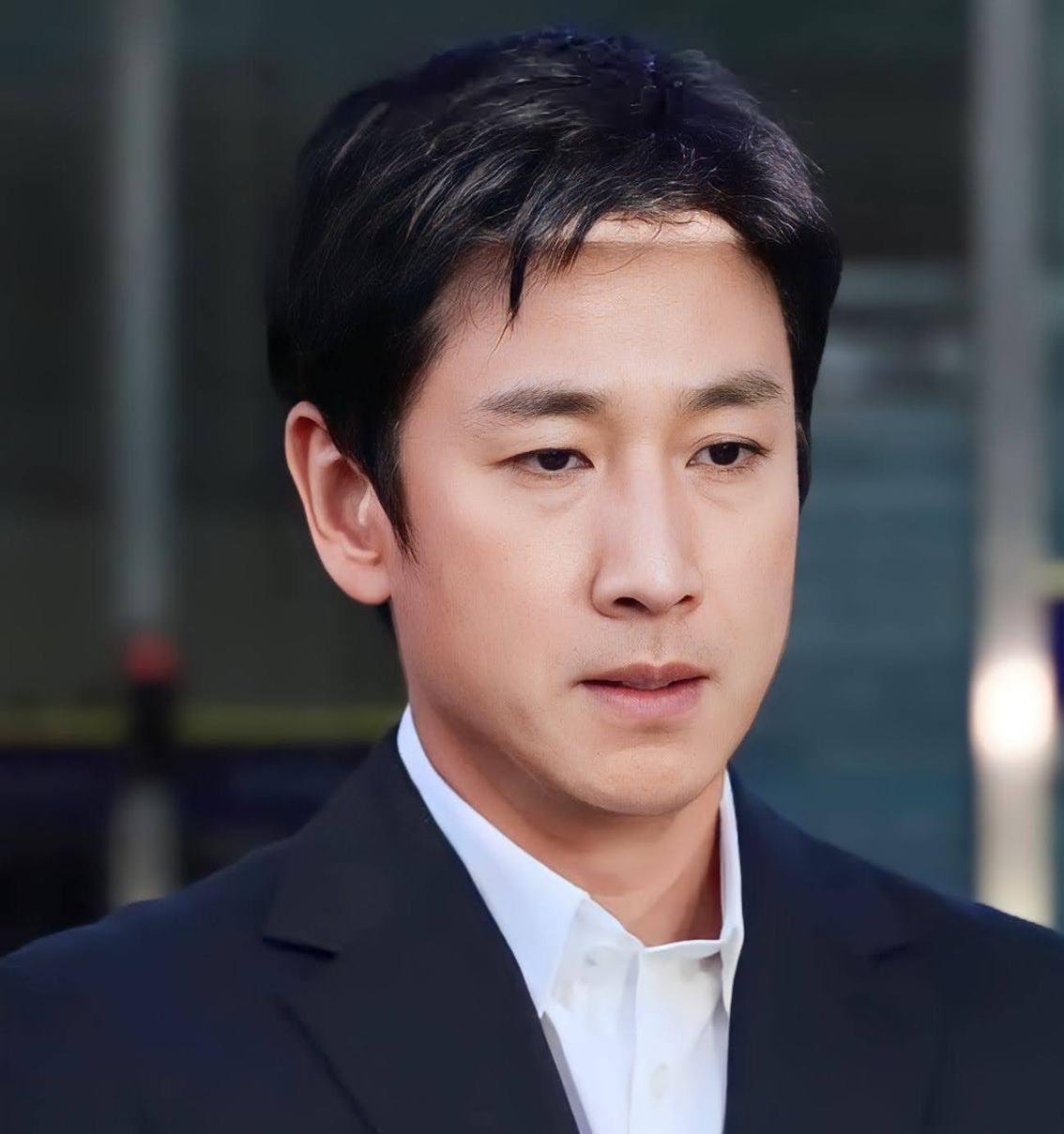
line with their criticisms of the media coverage of the investigation, the conference participants did not take questions after their remarks and did not hold a photo session.
KBS, a major broadcaster in South Korea, was a particular target of criticism from the artist’s collective, having previously leaked a private phone call between Lee and a female escort.
After the conference, the artist collective announced a petition signed by over 2,000 artists that they would submit to the
On the morning of 18th January, the Israeli Defense Force (IDF) levelled Israa University. A drone video published by Israeli media outlets captures the destruction of the last standing university in the Gaza Strip which was eradicated by 315 mines detonated in and around the structure.
As the last standing university in Gaza, the loss of this institution leaves an irreparable scar on Gaza as Palestinians are stripped of their identity and cultural integrity. The video of the University’s obliteration comes among recent waves of footage showing Israeli soldiers executing premeditated attacks on the Gaza Strip, ensuring it is uninhabitable for residents who may survive this war.
Israa University put out a statement on Facebook after the demolition, stating that the university buildings were being used by soldiers as a base and a centre for temporary detention and interrogation of captives during the ground assault on Gaza. Israa University is now among more than 390 educational institutes that Israel has completely or partially demolished since October 7th. It was also the last surviving university of the seven in the city. The destruction was not limited to the university’s main buildings but also included the graduate school, other campus buildings in north and south Gaza City,
and the first and only university hospital in Gaza. The University went on to declare that soldiers had looted the adjacent National Museum, which contained thousands of rare artifacts before it was also razed to the ground alongside the academic buildings.
Rather than being indicative of the chaos and brutality of war, the premeditated and controlled nature of Israa University’s complete annihilation was likened by an Associated Press journalist to the deliberate demolition of state infrastructure in the US. Targeting education centres is standard behaviour for the Israeli military. Birzeit University in the West Bank, among others, has suffered repeated raids over the past two decades, the latest being in September 2023, in which eight students were arrested, including the Student Council President. 80 of the 2000 students who have been arrested during these repeated raids remain in jail today.
“The attacks on cultural sites such as the National Museum eradicate the history of the Palestinian people, erasing Palestinian existence from the global storyboard.”
According to Korea JoongAng Daily, police say they did not take any “excessive” measures during Lee’s questioning and that Lee consented to the 19-hour-long questioning session. An anonymous officer said that, prior to his death, the investigation was in its final stages and that Lee was unlikely to be indicted.
In response to the conference and public backlash following Lee’s death, the Gyeonggi Nambu Provincial Police anticorruption and financial crime unit will look into how police handled Lee’s investigation, such as whether the police made Lee speak to the press before his questioning sessions. They will also look into the media reports of the investigation and whether they infringed on Lee’s privacy.
South Koreans’ reactions to these events have mostly supported Lee’s family and the artists’ collective and against the authorities. On X, formerly known as Twitter, users have posted messages such as “Lee Sun-Kyun’s cause of death was murder by the prosecution, police, and media’’ and “Following Lee Sun-Kyun, these scoundrels are going to cause another celebrity to commit suicide.”
On TikTok, commenters supporting the demands of the artist’s collectives posted supportive messages such as: “I’m cheering you on, please make everything clear so that his death does not become unfair.”
In a private funeral on 29 December, Lee was laid to rest. He is survived by his wife, actress Jeon Hye-Jin, and their two sons.

The war on Gaza is not only a surface-level attack on the people of Gaza but part of a continuous endeavour to tear the sense of national identity from Palestinian people. Through the destruction of Palestinian educational institutes, the next generation of Palestinians are left without access to their culture, heritage or generational knowledge. Similarly, the attacks on cultural sites such as the National Museum eradicate the history of the Palestinian people, erasing Palestinian existence from the global storyboard.
Not only is Israel murdering, violently displacing, and starving the people of Gaza, it is also systematically removing the identity of the Palestinian people and the connection they have with their heritage and culture.
On a chilly evening in December, I meet my friend for dinner in Amman. My head is spinning after spending all day trying to write an article in Arabic for a university assignment. She asks me about my day so I pose the question of media freedom in Jordan to her. She is straight to the point - there isn’t any, but everyone knows that.
My perception of freedom of speech in Jordan has spun full circle since coming to the country. Initially, my preconceptions made me apprehensive - an Arab country, reasonably conservative and ruled by a monarchy - most likely politics and the like are off the list for dinner table conversation. On arrival, though, I was pleasantly surprised - people do discuss the political situation, they do express concern about the governance of the country, and opinions are indeed vocalisedmaybe even more so than in Britain. A political conversation in a language classroom would be frowned upon if not outright against the rules in the UK. After a while, though, the penny drops. This freedom is superficial, the state control of information runs deeply and thoroughly through press institutions and media outlets, not to mention the internet.
But it’s necessary, Nofe tells me. She’s grown up in Jordan her whole life, moving to Britain for her undergrad and now finishing off her law qualifications back in Amman. She tells me to look around at who and what surrounds Jordan. Famously, Jordan is a calm and stable nation located in the eye of a storm of geopolitical chaos. It survived the Arab Spring unscathed, has good relations with both Israel and Palestine and is among the stronger economies of the region. This would not have been possible without an alarmingly tight fist squeezing the population into placidity. Allegedly, it is the intense surveillance of the media which ensures that the foundations of the country don’t crumble against external pressures.
I spoke to Dana Ziadat from the Jordan Times over WhatsApp. Where Nofe seemed resigned to the fate of the repressed Jordanian media, Ziadat’s comments were laced with suppressed rage. When I asked her opinion on the state of modern media in Jordan, she told me: “I believe that journalism is no longer a part of an authentic nation-building process as it should be.” Instead, in recent years, incidents of intimidation and pressure from governmental figures and organisations towards journalists have increased dramatically, coinciding with the introduction of laws targeting online media and their right to publish content related to contentious decisions of the government or the royal family. The updated cybercrime law which came into action in 2023 criminalises the sharing of information online without the appropriate certificate of authorisation, forcing media sites to engage in a bureaucratic ordeal in order to continue with their work.
Even before this update of the law, journalists have been tightly bound by gag orders and aggressive intimidation tactics from security services and government officials. In 2021, AmmanNet, the only media outlet to cover the Pandora Papers, which exposed information regarding the King Abdullah’s foreign real estate holdings, was pressured over WhatsApp messages to remove all their coverage on the matter. Earlier than this, in 2019, journalists from the Ad-Dustour and Al-Ghad dailies reported having been forced to remove articles on conferences discussing the Israel-Palestine peace plan.

Unsurprisingly, self-censorship runs rampant throughout the Jordanian media. Dana emphasised this in our conversation, telling me that at the Jordan Times “we practise selfcensorship at its highest level.” She went further, insinuating the true extent to which editors are controlled by powerful figures in society: “[editors-in-chief] are influenced by their connections in the government and security apparatus.” The self-censorship she experiences and feels necessary to undertake imposes “restrictions” on her ability, and the ability of journalists and editors alike, to “truly be professionals”: “journalists today are suffering due to the type of persons assigned to occupy leadership positions in mainstream media institutions.”
Yet, is the situation of freedom in Jordan essentially different from that that we see in the UK or the US? The end goal seems to be the same. Both are situations of political powers controlling, influencing or contradicting journalists and journalistic integrity in national media. Maybe the difference is that in Jordan there is a very blatant iron first gripping the voices of journalists themselves, disallowing them to freely express their views on the political, social and economic state of the country. Rather, Britain suffers from powerful members of society using the mainstream media for personal gain, and the media producers and the greater powers of the country seem to be one and the same. Ziadat pointed out something similar happening in Jordan, claiming that the “imposition of self-censorship” by leaders in the press sphere is often self-beneficial as they are “inherently biassed towards certain parties”
and may not even be themselves journalistic professionals. This leads to the commercialisation of media institutions “aiming to profit at the expense of journalistic principles.”
“Journalists have been tightly bound by gag orders and aggressive intimidation tactics from security services and government officials”
Media reform in Jordan would require very real systematic change that goes much further than just the press. In order to give journalists the freedom to comment on what they want, in the way they want, the governmental structure would need overturning. As it stands, while trust in the media breaks down worldwide, Jordan is among the worst cases of media censorship. According to the World Press Freedom Index 2023, Jordan ranks 146th out of 180 countries. Reporters Without Borders Secretary-General Christophe Deloire said, “journalism is the best vaccine against misinformation.” The Jordanian public, however, has been left completely vulnerable as media institutions fail to provide them with reliable sources of information, and the government actively blocks their right to be informed.

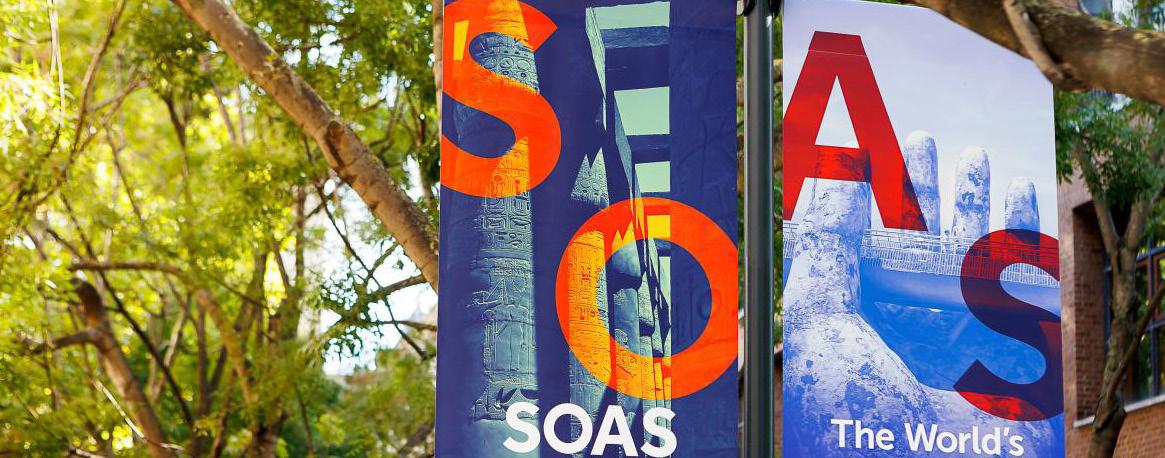
There seems to be an ever-growing chasm between the students and management at SOAS. Nothing encapsulates this more than SOAS investing more than £2 million in companies that support the Netanyahu-led Israeli regime.
The SOAS student body prides itself on its opposition to the Israeli regime, with its campus covered in graffiti and stickers supporting a boycott of an “Israeli Apartheid” and demanding a “Free Palestine”; demonstrating the madness of SOAS investing in these companies. Universities do invest - it is a cruel fact of the commercialised nature of higher educationbut one should expect their universities to invest in a way that somewhat reflects the values of their respective communities.
It strikes me that SOAS only invests in these companies to act like a typical university. SOAS never will be, nor should it try to be, the typical university. SOAS’ respect within the academic world derives from its atypicality and the unusual specialisations of each of the departments. Investments like these represent what has come to be known as the “UCLification’’ of SOAS. Sycophantic behaviour like this - the attempt to act like the bigger, more powerful members of the University of London - is pathetic and just weird.
No doubt, Adam Habib and the rest of SOAS’ confused management will justify these decisions as methods to ensure the long-term sustainability of the institute and prevent further financial trepidation. But what is the point of safeguarding SOAS’ future if the SOAS of the future is so far removed from the SOAS that everyone loves and respects? We are already witnessing the slow murder of SOAS’ soul; from how security seems transfixed on destroying any signs of student political expression, to the scrapping of the African
Studies programme. Both of these demonstrate how intent on “unSOASing” SOAS the current management are.
Obviously, students having direct involvement with how universities use their money would more than likely create unsustainable chaos. However, their views should at least be considered. The Students’ Union has regularly called for a boycott of an “Israeli Apartheid”. Yet, it seems these calls are entirely ignorable for managing staff. What, then, does the Students’ Union need to say to be heard?
SOAS has an alternative nature, one which is celebrated by the students. Evidently, this requires mediating by its employed professionals, but the student body should not be silenced or ignored. Management should seek to celebrate the best and most unique elements of the student body - not hide them like some great source of embarrassment. The source of embarrassment should be their dodgy investments, not the political views of their students.
Amongst its nine core values, SOAS lists ‘transparency’. However, it does not strike one as very ‘transparent’ that Palestine Solidarity UK - the organisation which initially reported SOAS’ Israeli investments - had to file a Freedom of Information request to obtain this information. Similarly, SOAS’ commitment to ‘promoting equality and celebrating diversity’ seems rather at odds with investing in a regime that is outrightly racist - with the government being partly made up of the incredibly homophobic Otzma Yehudit Party too.
“Management should seek to celebrate the best and most unique elements of the student body - not hide them like some great source of embarrassment. The source of embarrassment should be their dodgy investments, not the political views of their students.”
However, the most obvious breach of the core values must be the total disregard for number six - ‘community’. Allegedly, “SOAS recognises that its greatest assets are its staff and students. We will strive to create an atmosphere of community, collegiality and cooperation for all staff and students.” Yet one finds themselves struggling to understand how the relationship between the student body and management can be regarded as its “greatest asset” when SOAS’ management seems so committed to investing in a way which is contradictory to the values of both the institution and its students.
“Boycotts don’t work…I’m just one person so it won’t make a difference…Well the shop has already bought it, so I’m not changing anything.”
These are all phrases that I’m sure we’ve heard in the last few months. Recently, boycotts have been associated with rejecting companies/organisations/people who support Israeli apartheid. Most of us are probably familiar with the BDS movement, Boycott, Divestment and Sanctions, which “works to end international support for Israel’s oppression of Palestinians and pressure Israel to comply with international law.” Sounds great, but what does that have to do with us as individuals? There are many ways to be involved in the movement - just start by looking on their website and social media (@ bdsnationalcommittee on Instagram).
“Individualistic societies desperately want you to believe that you are fighting for liberation on your own. It’s just not true, and we cannot allow ourselves to internalise that line of thinking.”
What I’d like to talk about, however, is how boycotts can be carried out on an individual and institutional level. The majority of the things that I boycott are products that I use in my everyday life, including cosmetics, food (basically every chocolate bar ever), and clothing brands. Essentially, deciding not to engage with companies that I know support and invest in Israeli apartheid. The latter, to me, is the most important aspect of this discussion. We, as the public, are actively choosing not to give our money to companies that use it to do awful things.
If we can access information that explains clearly how a company supports the Palestinian genocide, I personally don’t see any reason for us to continue giving that organisation our money - cash we have worked very hard to make. Not to speak in slogans but, knowledge is power and silence/ignorance is complicity. In the same way that you choose to boycott, you can choose to avoid it by hiding behind the excuse of “I didn’t know.” That’s just not good enough.
There are so many companies supporting the Israeli apartheid regime, so much so that it may feel impossible to research and avoid all of them. This brings us back to the BDS movement and their targeted and organic consumer boycotts, which include a list of selected companies that “play a clear and direct role in Israel’s crimes” so that the boycotts are as impactful as possible. These are products that everyone should avoid, and the organic ones are super easy to do, with their culprits largely being fast food companies. It’s important to acknowledge that although we are individuals who are not buying these products, we are part of a collective community that’s boycotting the company. Individualistic societies desperately want you to believe that you are fighting for liberation on your own. It’s just not true, and we cannot allow ourselves to internalise that line of thinking.
This is not the first time that targeted boycotts have been used to defund and end genocidal acts. The BDS movement has taken inspiration from boycotts during the South African apartheid, the Civil Rights movement, and many more. Its historical origins are important for two reasons. Firstly, they are evidence of successful boycotts. Secondly, they demonstrate the link between collective struggles and liberation, across time and geographical space. It’s not a coincidence that South Africa is the country that has brought the case of genocide inflicted by Israel to the ICJ.
There is also the point that boycotting Israeli apartheid leaves out other communities that are facing unspeakable realities. Why should we choose to fight for Palestinian liberation over all of those others? My response to this is that a company which is doing awful things to one group is probably doing terrible things to more communities. This line of thinking also ignores the very real fact of collective struggles; the systems that have allowed and maintained white settler colonialism in Palestine are also the cause of genocides and terrible things elsewhere. Boycotting companies that reinforce these systems means we’re a bit closer to dismantling them and their effects everywhere. Basically, you’re never going to lose out or miss something by supporting Palestine through boycotting. I also think it’s unfair to criticise individuals for focusing on particular liberation movements and not others. We should be doing what we can within our capacity, if someone has chosen to boycott a company for Palestine, the impact this has will be felt in many places. Don’t allow cynicism and arrogance to cripple you into doing nothing at all.
“Individualistic societies desperately want you to believe that you are fighting for liberation on your own. It’s just not true, and we cannot allow ourselves to internalise that line of thinking.”
So now I hope it’s clear that boycotts are important, that they work, and that they also reflect the power we have as collectives. This is why the Economic Activity of Public Bodies (Overseas Matters) Bill - the anti-boycott bill - that was passed in Parliament, is incredibly worrying. This bill makes it impossible for public bodies to divest companies that are complicit in human rights abuses.
Recently, I found myself feeling a bit disheartened and honestly just very exhausted from repeating things that felt obvious and basic. It was really hard to see a way out of the environment we’re in. Someone then asked me what I thought

an anti-racist society looked like. I had no idea how to answer! I’ve only known a world that is racist, imperialist, and a billion different awful things. That person made me realise how paramount it is to envision a better future. If we can’t see a way out, then genuinely what is the purpose of boycotting, marching, or any other action? By internalising and sharing the mantra “things will never change,” you are disrespecting and devaluing yourself, firstly for not recognising your role and power, but also that of other liberation groups and individuals who dedicate lifetimes to dismantling oppressive structures.
History is filled with horrendous events. I’m sure people experiencing them and born into those situations struggled to see a society that looked different - but things change. However, they only change when you believe that they can, and when you join communities that are working to enforce that change. Boycotting is one of many actions you can take, and it’s also the most individually beneficial - you save money, become a bit healthier, and won’t fund genocide and ethnic cleansing… seems easy enough?
White Feminism does not represent me, but I have been conditioned to think that it does. I went to an all-girls state school where we constantly had assemblies and classes about ‘Feminism’ and how, as women, we stood for more than what society saw us to be. Yet, I could feel a metaphorical divide - that these everyday discussions were not fundamental concerns of mine, nor any other POC girl in the room.
This lingering feeling continued to dwell on me growing up, as I would consume media with little to no representation or witness women of colour across the globe face harrowing challenges for these women to be faced with silence from mainstream feminism. I wanted to know what this was, and it had a name. I later determined that the sentiment I referred to as ‘lingering’ arose from those who championed ignorance under the pretence of obliviousness. This is one which adversely affects women of colour and is a feeling which I encounter in today’s feminists.
bell hooks - an influential feminist activist - best describes this in her 1984 book, Feminist Theory: From Margin to Centre, where she says that “white women who dominate feminist discourse today rarely question whether or not their perspective on women’s reality is true to the lived experiences of women as a collective group. Nor are they aware of the extent to which their perspectives reflect race and class biases…”
POC Coming of Age Movies and Girlhood Whiteness has seeped into stories about youth.
Narratives that highlight POC are hardly seen in the public eye. I have always been fond of coming-of-age stories - especially when I was a teenager - and, of course, because that is
the age at which the genre would have been intended for me, is it not?
Historically, most films about young girls navigating life and its challenges are predominantly stories about white voices, and this has long controlled mainstream media. There has been an interest in femininity in coming-of-age films and an aestheticised portrayal of it - like in The Virgin Suicides (Sofia Coppola), Thirteen (Catherine Hardwicke) or Lady Bird (Greta Gerwig). All three of these films explore different aspects of girlhood, whether that be about the feminine sublime or about the relationship between a daughter and her mother.
While I do relate to the underlying meanings of these stories, these characters never look like me, and no matter how badly I want to make these films my entire personality, there is still the heavy feeling that ‘this isn’t about me’. When you see white faces in films constantly, especially in those relating to ‘girlhood’, you begin to wonder where there is a place for you in that world.
Modern perceptions of girlhood distinctly highlight the presence of non-intersectionality and white femininity. A noticeable disparity exists between coming-of-age films focused on white teenage girls and the relatively few that centre on young women of colour.
French films such as Girlhood 2014 and Divines 2016 focus on the lives of teenage girls and though they are not white, the stories told in these coming-of-age films are vastly different. The erasure of not only girlhood but childhood is clear. Both French films have black girls at the centre of the story but focus on trauma faced in their everyday lives. We see this constantly in media and it has become a whole genre. I want films that present the joys of girlhood. I am tired of seeing

the erasure of girlhood when it comes to us. If you asked me, “Hodan what would you like to see?” I would answer by saying, “I think firstly, we need more women of colour directors who want to change the direction of coming-of-age films and we need to allow the space for this. I want to picture girlhood on screen that I relate to.” And I not only speak for myself when I say that it is tiring to see such portrayals of trauma constantly. Though these are true stories that should be told, they are not the only ones.
“If I didn’t define myself, I would be crunched into other people’s fantasies for me and eaten alive.” – Audre Lorde.
Growing up, I did sometimes feel as though my presence and identity were never meant for the places I entered. The self-serving feminism and lack of intersectionality weighed heavily everywhere I went.
The need to address such issues, ones which affect multilayered individuals globally, is certainly a conversation to be had.
Opportunity for Black models within the modelling industry has been a persistent topic in the media for decades. In an industry seemingly built for the Kate Mosses and Cindy Crawfords of the world, representation of those whose appearances were antithetical to that of the industry has been scarce. When considering the pioneers of progress in this white-dominated industry, Naomi Sims would stand front and centre, recognised as the ‘first ever supermodel’, and trailblazer of the ‘Black is Beautiful’ movement. In 1968, Naomi Sims became the first African-American model to feature on the cover of Ladies Home Journal, a publication that had been in print for 80 years at the time.
The Battle of Versailles Fashion Show of 1973 saw an embrace of progress as eleven Black models, namely Pat Cleaveland, Norma Jean Darden, and Alva Chinn, graced the runway. Having Back models walk for such a high-profile show was unusual at the time and what started as a campaign to fundraise for the restoration of the Palace of Versailles, swiftly revolutionised how the fashion industry viewed Blackness in high beauty. With Vogue Italia printing an issue made up of only Black models in 2008, it was becoming understood that despite prevalent issues of representation on the runway; a space for Black models was slowly being carved out in the industry. Whilst acknowledging the feats of these Black models, we should ask how genuine these ventures of progress were. How far did this new space extend? And for whom? Are fashion houses and agents really engaging with the casting and treatment of their Black models? Because, despite the performance of Blackness disrupting the status quo in the
industry, it is apparent that Black models were and still are simply props in a game of progress in which the position they hold is tenuous.
Despite this, it is apparent that any ‘progress’ in the treatment of western Black models has not translated to the Global South. The spotlight of justice seems to not have extended towards models scouted from African countries.
In 2023 The New York Times wrote that modelling is no longer a silent profession, that models are now as heard as they are seen, despite the fact that this is clearly not the case for Achol Malual Jau. Achol is a 23-year-old South Sudanese refugee who was scouted in 2023 for Select Model Management to walk in that year’s London Fashion Week show. Select Model Management represents the likes of Devon Aoki and Sofia Richie. Achol turned heads on the runway and became a fixture on the social media fashion circuit. So how was it that six months later she found herself back where she started? Back in Kakuma refugee camp, with not a penny to her name and no break in the modelling world.
The sad truth is that Achol’s case is not unique, and even if the name of the agency changes the stories of exploitation stay the same. Nyabalang Gatwech Pur Yien is another South Sudanese refugee who was scouted from the Kakuma refugee camp. She was sent back 17 days later and was left with €2,769 in debt to the agency that flew her to Europe. It’s a tale as old as time, a predominantly white industry benefiting off of black bodies; just like the Battle of Versailles Fashion Show and Vogue Italia’s 2008 issue.
“Because, despite the performance of Blackness disrupting the status quo in the industry, it is apparent that Black models were and still are simply props in a game of progress in which the position they hold is tenuous.”
Agencies all over the Global North recruit specifically from refugee camps all in the name of diversifying the runway, setting aside the humanity of these individuals. What makes these stories even more upsetting is the aspect of hope Achol, Nyabalang and others like them hold. Being sold the dream of finally being able to earn money and provide for their displaced family members, after playing the role of the exotic on the runway, they end up carelessly tossed to the side, their preexisting trauma ignored. The objectification of Black people plays a crucial role in this practice and is a reflection of the discriminatory climate we exist in.
All of this is to say that just like many of the existing industries in the West, the decolonisation of the fashion and modelling industries is greatly needed. It is essential that the existing barriers to entry into the industry for Black women, particularly Black women from the Global South, are broken down, so that hopeful Black models like Achol Malual Jau and Nyabalang Gatwech Pur Yien can truly become a part of the show.
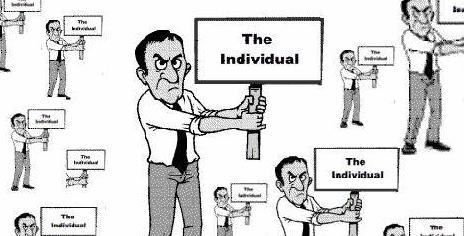
‘Hyper-individualism’ is the concept being promoted under the disguise of ‘self-care’ by influencer after influencer online. The inherited belief is that being kind doesn’t get you anywhere. A sign of this belief system is the rising popularity of YouTuber TheWizardLiz teaching us how to be more confident, and to live by the “whatever I want goes first” lifestyle. Despite the alarming echo of the belief that ‘nice guys finish last’, this hyper-individualistic approach to life is also detrimental on a larger scale to creating a more tolerant world, overcoming the loneliness epidemic and living happier, fulfilling lives.
“We are a mosaic of everyone we’ve ever loved and we should embrace this humanness about us.”
This is all a symptom of late-stage capitalism. On a macro scale, as a society, we wish to live in a more tolerant world and dismantle capitalism. Yet, on a micro-scale and in moments of self-reflection, we preach about putting ourselves first, to ‘f*ck being kind’ to live by, ‘they don’t serve me, therefore I should cut them off’. This epitomises the hyper-individualistic mindset, one which capitalism thrives off and one which states that you should prioritise being in competition with your peers rather than collaborating with them. Yet, all this leads to is a more isolated, consumer-driven and unfulfilling life.
I think that we all implement this belief when we first start university. We see everyone as a threat and fall into the pattern of holding resentment toward our peers, viewing everyone as our competition. We believe we cannot succeed if other people are succeeding. But this is detrimental to the foundations of society.
Most Western philosophy upholds this idea of looking at life as an individual. Of being self-focused. The belief that you are the ‘main character’ clashes with other conscious minds as you realise that you are not achieving the best grades, that you do not have the most alternative taste in music, and that you don’t have the most politically ‘unique’ take on a topic. This desire to differentiate oneself from other individuals creates constant clashes and a never-ending dilemma within our lives. It’s a flawed belief system and way of approaching life.
When we are so preoccupied with ourselves, we forget about the people behind the products we are consuming. Racing to keep up with fashion trends, yet only 2% of all garment workers worldwide are paid a living wage. Upgrading your phone with every new iPhone launch, fuelling the ongoing exploitation of the people of the Congo. How do we justify our need to consume, over labourers and human lives? Stepping back, we can reflect and recognise that our perpetual anxiety and need to consume in justification of ‘defining ourselves’ is actually harming millions of people worldwide. In light of this, we can begin redirecting our money and energy elsewhere to consume less and do so more ethically. Our right to buy and consume does not justify the exploitation of labourers.
This hyper-individualistic mindset also
feeds the ongoing loneliness epidemic and mental health crisis in the UK. In 2022, 49.6% of Britons reported feelings of loneliness. The black-and-white approach to life and collective lack of nuance are contributing to this epidemic, a mindset which is leading you to live an unhappy life. Natural selection rewarded our ancestors for collaboration and forming relationships with each other. The individual would not survive and our genetic makeup evolved to adjust to this, causing us pain in times of loneliness, just as our stomach would growl in times of hunger. Forming connections is ingrained in our biology.
No matter how unique we think we may be, we are all the melting pots of the world. We are all alike. Every aspect of you has been moulded by another person. Every laugh you’ve echoed has imprinted on your soul. You are a creation of all the people you’ve met. As said by Chuck Palahniuk, “Nothing of me is original. I am the combined effort of everyone I’ve ever known.”
We are a mosaic of everyone we’ve ever loved and we should embrace this humanness about us.
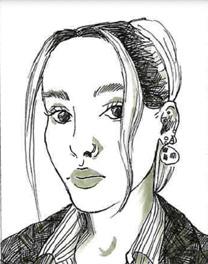
While some have claimed 2024 to be the ‘year of the messy girl’, the ‘clean girl’ trend that plagued much of 2023 might be taking its final sips of green juice. The polished ideal of a clear-skinned girl with slicked-back hair who always enjoys her salad while sipping from a Stanley cup has long caused debate, often due to the obvious classist and fatphobic undertones of the trend.
Recently, a new term has emerged on TikTok that describes a more general trend, which even those of us uninterested in green juice might recognise. ‘Performative cleanliness’ gained traction after a woman posted a TikTok of herself cleaning her Christmas tree, captioned with a claim that this was something you need to do.
The video started a wider conversation on the platform over the so-called ‘performative cleanliness’ many engage in. Whether that is by shaming others for not cleaning their Christmas tree, showering three times a day, or only using your towel once before washing it, it is all part of what The Atlantic’s Derek Thompson calls the ‘Hygiene Theater’. So what is the problem with this excessive cleaning? Is hygiene not positive, no matter who it is performed for?
“Cleaning is not an action done to ensure health and wellbeing anymore, but rather an action of performance.”
Social media is of course at the core of the issue. For years, platforms like TikTok have actively been swallowing our personal lives. Now, it has reached our most private spheres, with even our personal hygiene routines dangling mid-air over Silicon Valley’s gaping mouth. Prior to the digital age, how we clean and wash ourselves was a topic of conversation one only had with close friends and family, but now, many seem to share their ‘everything showers’ and their ‘Sunday reset cleaning sprees’ with the general digitised public. Even the most personal parts of our lives are now publicised.
Not only is social media making us post our private lives, but its visual focus additionally creates a culture of presentation. It is not important what one does anymore, as long as it appears well. Performative cleaning has not surfaced out of the blue but is part of a pattern of constant performance. The term ‘performative activism’, for example, describes activism that is entirely done as a performance (such as sharing infographics on Instagram) which lacks actual engagement and action. It especially peaked during the pandemic, when many were forced into performativity due to the restrictions put in place. As we have moved past this, why are we still developing new forms of performative actions? Some might say it is an inevitability in our digitised and visual lives.
Furthermore, in the current visually-focused cultural context, content that optically satisfies our brains has gained the utmost value. Videos of dusty surfaces being wiped clean are now treasured online, and cleaning content as a whole has become extremely popular on platforms where the way one appears is more important than how one actually lives. Social media and its visual focus on appearance have provided fertile grounds for performative cleaning; cleaning has, after all, always been strongly visual.
This, paired with a global pandemic that created new attitudes around personal hygiene, has boosted both germophobia and cleaning-product-philia. Additionally, the cleaning industry has turned towards young people. There is of course nothing wrong with longing for cleanliness. The problem is when it becomes performative. In addition, performative cleanliness, as with the ‘clean girl’ trend, has many problematic aspects.
Firstly, it is clear that performative cleaning is gendered. While men are praised online for ditching their basic threein-one soap, women are shamed by performative cleaners if they fail to shower twice a day. Ideas around female ‘purity’ may make women feel such pressure. Similarly, patriarchy allocates actions such as cleaning to women whilst the growing cleaning industry reinforces such gendered expectations in the name of patriarchal capitalism.
Secondly, classism and Eurocentrism continue to shape the conception of what cleanliness means. Being able to clean excessively to appear a certain way to others is a type of white and bourgeois privilege. As those of us who grew up in immigrant households might have experienced, topics such as personal hygiene and household sanitation are often affected by
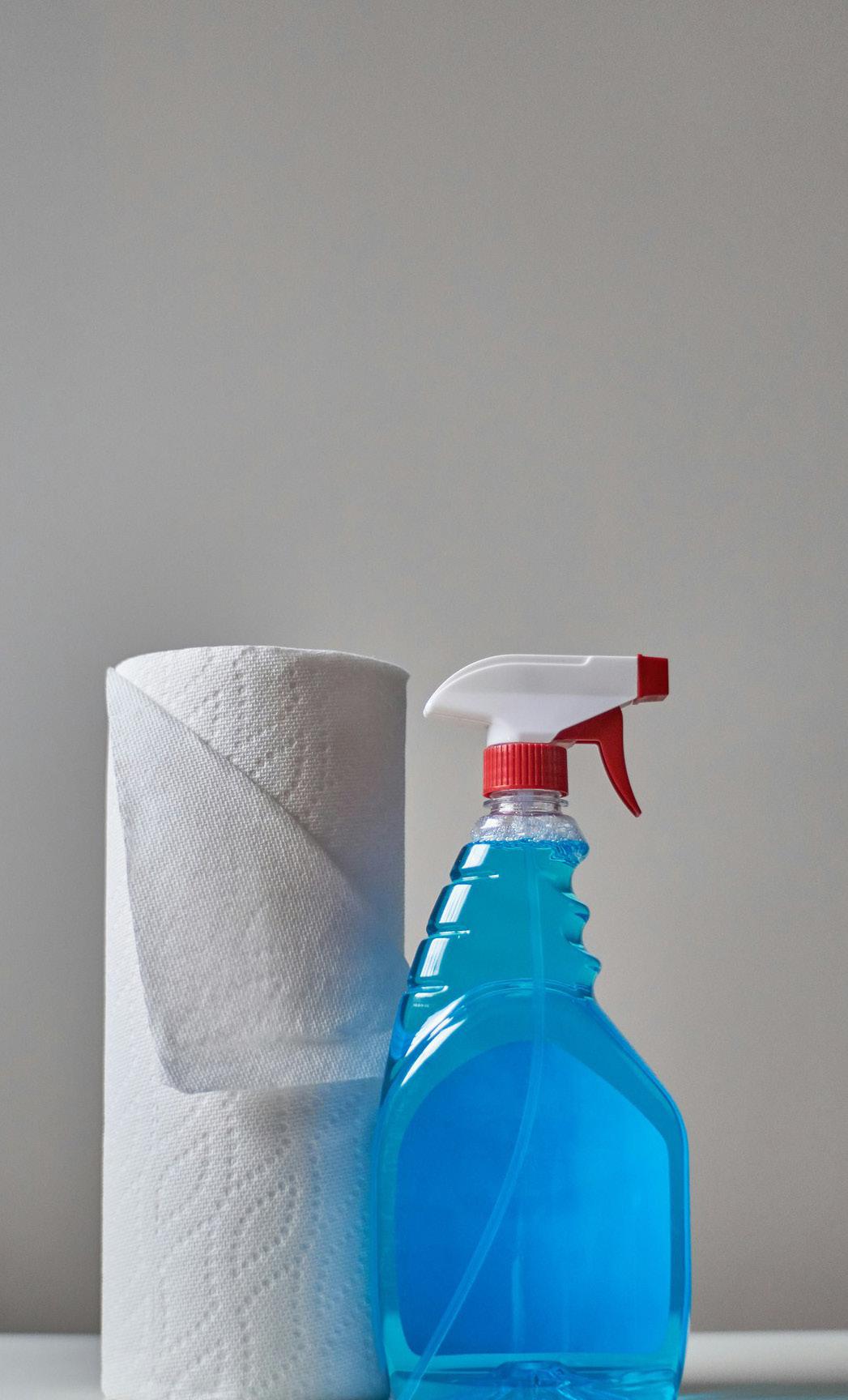 (Credit: Crystal de Pasillé-Chabot/Unsplash)
(Credit: Crystal de Pasillé-Chabot/Unsplash)
cultural differences and economic restraints.
It is interesting to see how banal activities such as cleaning have become part of our generation’s need to self-curate and present in certain ways. As the public has been brought into our phones, cleaning is not an action done to ensure health and wellbeing anymore, but rather an action of performance. We no longer exercise to feel well but to fit the ‘clean girl’ ideal. However, we must not reactionarily start the new year by perfecting our new ‘messy’ facade, even though it might feel liberating. Almost everything we do now is performative. I hope it does not always have to be that way.
In a world that has achieved space travel and self-driving cars, it seems closing the gender gap in the field of economics is an impossible mission. Women and girls across economics, banking, finance and other male-dominated fields face a perpetual struggle against the gendered bias of the ‘Invisible Hand’. Women are confronted with these prejudices not only in the corporate world but also in classroom settings, making recognition of our achievements a little bit harder but a lot more vital.
From determining the elasticity of demand for pizza delivery at 2 AM to debating the utility of a spontaneous road trip, we turn economic theories into a laughing matter (Keynes is probably rolling in his grave as you read this). Like the iconic women that have come before us, we have come to realise that the pearl headbands and bows were just decorations for the prized possession that lay beneath them. Often finding ourselves outnumbered in a classroom has just meant we have learned to command the attention of the sceptic gents with misplaced confidence that doubt us. According to the House of Commons Library, women currently make up only 37% of economics students. Female economics students contribute significantly to the diversity and dynamism of the academic landscape; challenging traditional norms, they foster a richer exchange of ideas and perspectives.
The prospect of entering into the corporate world is daunting for many; competition is fierce, and expectations are high For women in economics, however, it can sometimes feel as though we are trying to enter a secret password society where the only requirement is a Y chromosome. According
to research by the University of Cambridge in 2021, only 26% of economists working in UK academia are female, and only 15% of economics professors are women. This poses the question, do women hate economics or does economics hate women? Entering the corporate world alone is the first hurdle, as even achieving a respectable position as a woman does not guarantee you an equal wage to your male counterparts. According to the ONS, the gender pay gap was 14.3% in 2023, yet higher earners exhibit a much larger gap. These male-dominated fields thrive off an ‘Old Boys Club’ so old it’s practically collecting a pension… is it not time we made more space for other demographics? Rebecca Maher, who works at Metro Bank and has been in the industry for over two decades, speaks of the setbacks experienced when navigating pregnancies, failed pregnancies, raising young families, menopause and other health concerns. Maher says these issues make the industry “unattractive to the new generation of women, which then perpetuates the male-led agenda.”
“It can sometimes feel as though we are trying to enter a secret password society where the only requirement is a Y chromosome.”
Despite the ground-breaking display of male privilege, women are still successfully gaining more space within the
discipline. In October 2023, Claudia Goldin won the Nobel Prize in Economics for uncovering the reasons for gender gaps in labour force participation and earnings. The success stories in this field pave the way for aspiring female economists. Navigating gender inequality is never an easy feat, and it is imperative that we recognise the challenges unique to the field and actively work to overcome them.
May we raise a glass and shatter a ceiling for the iconic women who have come before us and the ones who will follow… bottoms up!

Both the tales of Shamima Begum and Gypsy Rose caught people’s attention, sparking debate, moral dilemmas, and varying degrees of empathy. These two controversial figures are riding an exhilarating oscillation of social change as they separate from one another.
Debates about radicalisation, personal responsibility and citizenship have been dominated by Shamima Begum’s story of leaving the UK to join ISIS. The mixed reactions to her situation were varied, with several differing opinions formed around her behaviour and actions. On the one hand, some tried to understand her and maintained that she was a vulnerable teenager controlled by extremist ideology. On the other hand, some held a negative opinion of her and claimed that she intentionally left home to pursue terrorism-related activities.
“Ultimately, the reaction to Shamima Begum and Gypsy Rose reflects the complexity of human nature, the moral dilemmas surrounding their narratives, and the difficulties that society faces in balancing empathy with responsibility.”
Similarly, there were mixed reactions to Gypsy Rose Blanchard, the orchestrator of her own mother’s murder after years of alleged abuse. The case of Gypsy Rose takes on a sinister tone, with empathy and doubt present throughout. Numerous individuals sympathised with the young woman who declared herself a Munchausen sufferer and comprehended the desperate actions she took to escape her supposed confinement. Meanwhile, some questioned the authenticity of her victimisation and claimed that she had done it intentionally.
The conflicts of responsibility and compassion that exist between Shamima and Gypsy are inseparable. While some believe it is important for individuals to be accountable for their actions, others maintain a sense of responsibility regardless of their circumstances. The dichotomy between personal agency and external influence resonates in the public debate surrounding these cases, with the legal dispute between Shamima Begum and Gypsy Rose fuelling these tensions. A recent controversy surrounding the rights of individuals who willingly joined an extremist group has arisen due to Shamima’s efforts to fight for her return to the UK and regain her citizenship. After Gypsy was incarcerated and put on trial, it was uncertain how effectively the legal system dealt with cases that involved psychological abuse.
These arguments have turned into battlegrounds on social media sites where hashtags and trending topics reflect a range of perspectives. While Gypsy Rose films her Get Ready With Me (GRWM) with her personal stylist and makeup artist, her TikTok comment section is filled with people calling her an
icon and professing their love for her. As she enjoys the newlywed bliss with her husband whom she married last year in prison, she simultaneously defends him on Instagram proclaiming those with an issue of it are “jealous because you are. [He is] rocking my world every night… yeah I said it, the D is fire. Happy wife, happy life.”
Conversely, some people believe that Shamima Begum was an unrepentant individual who willingly enlisted in the ranks of terrorism. Speculation has mounted since to say that she has been honest about her faults, with some warning that there could be ‘safeties’ waiting for her to come back. The debate surrounding Begum goes beyond her personal story and becomes emblematic of the broader challenge of combating radicalisation and extremism.
The court of public opinion is both unreliable and infallible. Many have voiced their thoughts fervently, with varying degrees of empathy and outward condemnation. Ultimately, the reaction to the stories of Shamima Begum and Gypsy Rose reflects the complexity of human nature, the moral dilemmas surrounding their narratives, and the difficulties that society faces in balancing empathy with responsibility.
Despite the ongoing stories about these controversial individuals, one thing remains unaffected - the divisive public eye will persist as a clear reminder that human experience is not inherently monochromatic, but rather characterised by contrasting sentiments, beliefs, and cultural norms.
As we enter the new year with a cynical obsession with bows, the mask unveils underneath a similar 2014 mania: the finger moustache. Indeed, the recent recycling of trends has spearheaded the desire to travel to the past, only now we have reached a stop too close for comfort. From the return of ‘indie sleaze’ fashion to colloquial term flashbacks, it seems one cannot ‘keep calm’ and enjoy the present as the self-perpetuating cycle of nostalgia eats away at itself.
The resurgence of 2014 is perhaps the guilty pleasure of many, but one must admit it is impossible to deny the tension of ‘Sweater Weather’ as soon as it is heard. “I want the world in my hands,” Jesse Rutherford sings as a plethora of blue-haired teenagers swoon with the relatability of such metaphoric songs. Grandiosity or true expression, popular platforms such as Tumblr during 2014 sparked an awareness of how simple it is to voice your identity online. Kylie Jenner, otherwise referred to as ‘King Kylie’, first catapulted the blue hair movement on the online forum, which then expanded to a general championing of hair dyeing to become the ultimate cool girl. Not far off idolatry, Kylie became the God and lost girls became the subjects. With vivacious pink hair, she has now announced the comeback of her 2014 image alongside a caption of “Hiiii, remember me.” Of course, the comments are nothing but short of the equivalent rejoicing Kylie enjoyed ten years back.
The persona of the Tumblr girl next targeted its sibling platforms to pollute. Today, the name Troye Sivan may bring to memory his new club-esque hit ‘Rush’. In 2014, the retired Tumblr veterans recognised him for his stealthy substance abuse promotion, or rather, ‘relatability factor’, in his song ‘Happy Little Pill’. Beyond ‘sipping life from bottles’ with ‘nothing but time to kill’, Troye Sivan was one of the most known YouTubers during his time alongside figures such as Tyler Oakley, Jenna Marbles, Smosh, and Tana Mongeau. With videos lasting a minimum of ten minutes, these influencers offered attention to those on the other side of the screen, providing friendship and a touch of philanthropy with the ice bucket challenge. A little retwisting and one realises
that our listening comprehension must be enhanced in 2024, as podcasts have instead taken the spotlight. Resurfacing from her 2018 TanaCon scandal, Tana Mongeau’s podcast ‘CANCELLED’ is the recent topic of discussion on TikTok, meanwhile, Anthony Padilla from Smosh has been utilising the art of podcasts since 2021.
Twenty One Pilots had a migraine ranging ‘from up down and sideways’ in 2014, and now TikTok has manifested this suffering to the youth in 2024. The term coined to the former is ‘doomscrolling’, often described as surfing online in a spiral. Since the rise of the platform in 2020, TikTok has become a breeding ground of microtrends, incessant discourses, and the illusion of choice within your identity. Yes, there are many aesthetics you can shape yourself into, but because of the addiction nurtured from ten-second clips setting off our dopamine receptors, the act of scrolling merely gives us everything ‘but time to kill’. No wonder revivals of decades are ceaseless… Now we understand why Jesse wanted ‘the world in his hands’.
Through TikTok, we additionally endured the rise of
Colleen Hoover, a young adult fiction author with a focus on romance and thriller. Is it possible, however, that Hoover’s magnum opus, ‘It Ends With Us’, failed to pay homage to its creator? Though not similar in fiction, the birthright of the mysterious book girl belongs to ‘The Fault in Our Stars’, so much so that the latter’s movie adaptation earned $307.2 million at the box office. Like the niche of having ‘a rolled cigarette hanging out’ of one’s mouth, as sung in ‘Pumped Up Kicks’, the protagonist of the movie charmed the young population with his cigarette metaphor. Stakes are high for the release of the ‘It Ends With Us’ movie adaptation this year, but there is evidently no competition when 2014 is lurking her way back.
Yet, is she truly back? Maybe for the first month of the new year. Influencers often err with predictions and immediately sideline the re-emergence of trends once a new memory is recalled. So far in 2024, individuals have already expelled leather trousers and cowgirl boots, both a staple of the bohemian ‘indie sleaze’ 2014 fashion. Ultimately, then, as Lana Del Rey predicted, it is hopeless to wish 2014 back when the latter is ‘no longer young and beautiful’ and over-consumption is dominating the social cosmos.
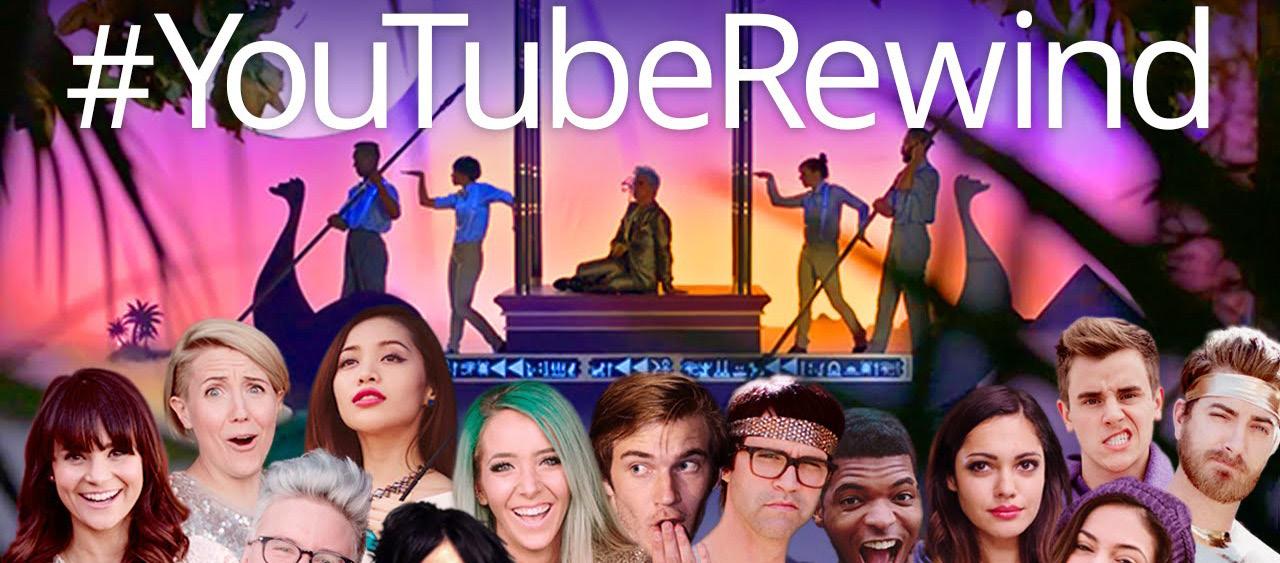
It comes as no surprise that the new year offers us a renewed spirit; change can occur in a space where change is socially acceptable – encouraged, even embraced. As one year rolls into the next, I often find myself making a video diary, reflecting on the year past and my goals for the year to come. As I’ve gotten older (20 years under my belt), I’ve been less and less inclined to the New Year’s spirit; the enchantment and wonder that the New Year presented in my youth seemed to slip away from me ever so slowly, becoming alarmingly apparent this past holiday season. Whilst I still engaged in my own personal formalities, it occurred to me that I had less of a vision for myself than in previous years. I thought to myself that the concept of a new year and thus the resolutions that came with it were quite arbitrary; even on January 1st, it’s still the same 24 hours that’ll come, that have come for billions of years before then. The sun will rise and fall the same on this day as any other, I will still wake up and fall asleep as any other, and the earth will still pirouette in place and dance around the sun as it always has. So really, what’s the difference?
‘New year, new me!’ is a phrase that has resided on the tongues of millions of people, if not billions, as winter blooms into the bitterness of the endless stretch of time we call ‘January’. An undoubtedly difficult month for the majority of the public after indulging in the festivities of the holiday period, with empty pockets and full bellies, the season of change is declared! Out with the old, in with the new; the pendulum swinging aggressively from decadence to discipline. In January, amid financial hardships and seasonal depression, we make the decision in chorus to be our best selves.
I believe the push to be better during this time comes from the holiday period providing us the privilege to slow down. Without the noise from the outside world fogging our minds, our inner voice becomes clearer. What fuels this drive to be better during this time? Perhaps it’s the luxury the holidays provide – a chance to slow down and let the inner voice gain clarity. While some argue for immediate change, asserting that the new year is merely a symbolic shift, there’s an undeniable allure to the January reset. Delaying change only breeds tougher obstacles, where momentum wanes, and the initial enthusiasm dwindles. Comfort, it seems, is the silent adversary of progress.
“The hope that comes with change, and the support that comes with knowing everyone has the same goal – it’s unifying.”
In the face of clichés about deserted gyms and abandoned resolutions, there’s an admirable spirit in people attempting change. The communal aspiration for self-betterment during the new year creates an intangible camaraderie in the air. Everyone strives to be their best selves, and as students, we find ourselves part of this collective journey. The hope that comes with change and the support that comes with knowing everyone has the same goal – it’s unifying. There’s a taste of comradery in the air when the new year hits; everyone wants to be their best selves, and we should let them! Yes, most of the gyms will be empty by January 31st and most people will fall back into their default diets by the second week of the year, but shouldn’t we applaud people for trying? Not everything may be roses and sunshine, but don’t we owe it to ourselves to believe in the possibility of positive change, even if just for a moment? The new year offers a canvas of potential – as students, we stand on the threshold of countless possibilities, ready to paint our narratives of growth and self-discovery.
Culture Editor: Amran Abdiqadir-Mohamed

In an unexpected twist for the 2023 season of ‘I’m a Celeb’, the public’s designated villain was not the divisive politician Nigel Farage but the YouTuber, Nella Rose. Known to Gen-Z for her humorous videos and sharp retorts, Rose was subjected to a torrent of social media abuse, revealing Britain’s latent prejudices, and most of the public’s failure to critically evaluate the role of selective editing when consuming faux-reality television.
Rose was heavily taunted for setting boundaries in the intense jungle environment, a measure intended to protect her mental and emotional health. This raises the question: would other contestants have faced comparable criticism if they had done the same? The likely answer reveals a double standard rooted in unconscious biases. Her experience highlights the challenges Black women face in the public eye. It is not just about setting boundaries, it is about doing so without fear of backlash. Some might argue that setting boundaries in a show like ‘I’m a Celeb’, which is inherently about pushing limits, could be seen as going against the spirit of the contest. This perspective fails to consider the importance of mental health, especially in competitive televised environments.
We must bear in mind that just as a Rose cannot exist without thorns, it is unrealistic to expect Nella to be entirely flawless and free from misunderstandings, as imperfection is an inherent part of our shared human experience. Despite her reconciliation with Fred Sirieux, the damage was already inflicted. The spark of misogynoir was lit, and social media was all too eager to fan the flames. One user on X even remarked, “I lost my dad less than 18 months ago, but I wouldn’t react like that. What an absolute psycho.” This comment overlooks numerous studies concluding that there is no normal way to grieve. Yet, viewers seemed to disregard the fact that everyone’s grieving process is unique
It cannot be ignored that the media also played a role in fuelling the controversy. Newspaper headlines sensationalised her comments about Nigel Farage’s anti-immigrant stance. The streets became a verbal poll of her grief-stricken reaction, sparking a heated national debate - a mere tactic designed to create news. The media’s portrayal of Nella Rose raises questions about the ethics of reality television editing. ‘I’m a Celeb’ is a show designed for entertainment. The producers have the power to manipulate footage to create narratives that may not reflect the reality of the contestants’ experiences. In Nella Rose’s case, it is worth questioning whether her portrayal was correct, or a product of selective editing. Still, it is also important to consider the role of the audience in interpreting these narratives. As viewers, we have a responsibility to critically evaluate the content we consume and to question the narratives presented to us.
The public reaction Nella faced only exposes an uncomfortable truth: racism is still very much alive in our society.

The fact that she was paid the least out of all the contestants is a stark reminder of the racial disparities that persist even in the world of entertainment. For instance, Nella Rose was paid £40,000, while Nigel Farage, a controversial figure, was paid a staggering £1.5 million. This pay disparity is not just ‘unfair’, it is a reflection of the systemic racism that continues to rot our society.
“The spark of misogynoir was lit, and social media was all too eager to fan the flames.”
It is crucial to acknowledge the severity of the criticism she has faced. On numerous occasions, she has been derogatorily referred to as a “UK beast” on the social media platform
TikTok. This term, steeped in misogynoir, is a stark example of the disproportionate backlash she has received. The question arises: how can a minor misunderstanding lead to such a harsh label? This incident is not unique but indicative of a broader pattern of how Black women are treated in the media. They are often denied the empathy and understanding extended to their white counterparts.
As we reflect on the treatment of Nella Rose, we must confront the racism that fuelled it. Only then can we hope to develop a society where Black women can finally be publicly perceived without intense media bullying. It is high time we asked ourselves, Britain, are you not embarrazzed? You’re right, Nella; this truly is embarrazzing.
Important conversations about pay inequality for Black women have recently emerged from the ‘The Colour Purple’ press tour, particularly in regards to Taraji P. Henson, the Golden Globe and SAG award winner. The 26th of January marks the UK release of the film, a moving story about the traumatic experiences of characters such as Shug Avery (played by Henson) and Celie (played by Fantasia Barrino). This film follows the life of an African American woman who was born during a time when Jim Crow laws legally enforced segregation and racial violence against Black people. In addition to racial oppression, Celie is a survivor of gender-based violence.
‘The Colour Purple’ is a moment for Black artists to deliver a profound story that speaks to the history of segregated America, whilst inspiring and representing Black people on screen. Therefore, Taraji P. Henson’s admission that she “almost had to walk away from The Colour Purple” in a SAGAFTRA interview discussing the Hollywood pay gap, is deeply disappointing. This film provides a platform for the intersectional suffering that African American women face as a result of racism and patriarchy, and without Henson’s beautiful contribution, the story would not be conveyed in the same way. So why doesn’t she receive the same financial compensation as white actors/men of the same calibre and experience? Portraying experiences like those in ‘The Colour Purple’ must require a great deal of emotional labour; the fact that actors like Taraji
“I’ve had enough of seeing established, talented Black actresses fight for basic respect and the pay they deserve! They are the entertainment, and they bring in the money ”
are giving incredible performances, bringing audiences to tears while receiving inadequate compensation undervalues the work, time, and true artistry they put into these productions.
Taraji has been vocal about the pay disparity in Hollywood on and off for many years, but it has recently blown up. To put this conversation in context, the American Actors’ Union SAG-AFTRA recently went on strike from July 14 to November 9 2023, the longest action in its history. Members who participated in the strike demanded an increase in both the minimum wage and streaming residual earnings. Alongside this, the Writers Guild of America’s strike highlighted the disparity in pay for writers, overall, these circumstances demonstrated how Hollywood (more like Hollyweird) is rubbish and exploitative.
These situations are the result of years of unequal pay and corporate greed, but for Black women like Taraji P. Henson, this reality is further worsened by ‘Misogynoir’. This is intersectional discrimination against Black women, who face
SNL has once again drawn attention for controversial jokes; this time featuring their host, Timothée Chalamet. In a skit that many deemed “too soon” and distasteful, the Comedy Trio “Please Don’t Destroy” joined Chalamet in attempting to use a struggling musician’s storyline for comedic relief. The sensitive nature of the topic, involving an ongoing genocidal conflict between Israel and Gaza, that has resulted in the death of 24,000 Palestinians, undoubtedly sparked public outrage. The issue, however, is that public outrage is often never mirrored by much administrative accountability from these sketch comedy shows or the celebrities that they feature. It really brings a new nasty element to “How far is too far?”
This particular skit involves Chalamet’s character contemplating a trust fall into traffic, with the trio trying to dissuade him. However, the discomfort intensifies when Chalamet’s character makes a tasteless joke, naming his band “Hamas”. The trio awkwardly responds, refusing to promote a band called “Hay-mus.” The timing, the delivery, and the choice of punchline contribute to criticisms of insensitivity, adding to SNL’s history of such incidents. Additionally, the choice to make light of this particular conflict on “SNL” became highly suggestive of media bias when confronting political issues. Especially when we look at the show’s earlier display of respect for Ukrainians, post Russian aggression. Yet, the curtains do not close, the show continues; this is simply the type of rodeo they revel in. From the controversial “Bill Hader’s Blackface”
sketch to their culturally insensitive parody of “Aladdin”, SNL has a history of being in the hot seat. Despite this latest incident raising questions about accountability, the response remains elusive. The show and the cast members involved maintain complete radio silence, and Western media appears either ignorant or selectively engaged once again. While Timothée Chalamet seems to bask in positive public attention, notably with his role in the uprising Willy Wonka film, he manages to deflect heavier criticism by attributing the controversial skit to the scriptwriters. However, the fact remains that he delivered the joke, using his platform to bring attention to it.
“Will SNL continue trivialising real and devastating political events to “this week’s drama” ? ”
The media industry’s inconsistent response becomes apparent when considering examples like American model Bella Hadid, who faced consequences, losing modelling jobs, brand deals, and connections due to her advocacy for the Palestinian cause. The glaring bias is undeniably obscene, and while efforts to demand accountability continue, it prompts the question: Will SNL continue trivialising real and devastating political events to “this week’s drama”? The disheartening trend of treating serious issues, such as the Palestinian genocide, as
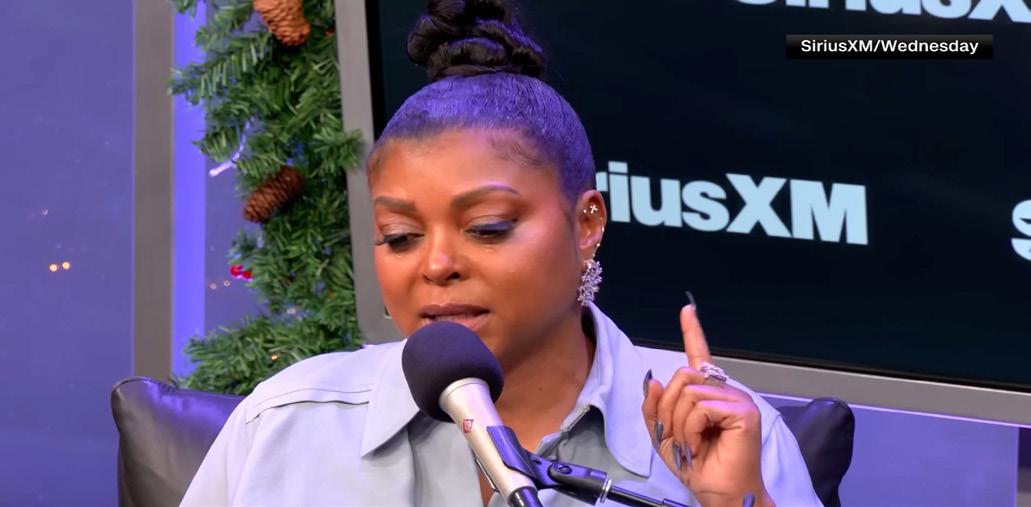
oppression because of their gender and race. Gabrielle Union is another actress who has addressed these unfair circumstances, and it is simply wrong that these major production companies and Hollywood CEOs are paid millions for the work that Black women put into their roles. I’ve had enough of seeing established, talented Black actresses fight for basic respect and the pay they deserve! They are the entertainment, and they bring in the money, but it seems that those in power only want to profit off of their work without fair compensation.
As a Black woman, regardless of your job, this will resonate. Having to work twice as hard to prove yourself, being treated as if you should be lucky to have the opportunities you do, and not receiving well-deserved treatment or compensation due to underestimation. It’s disheartening and it makes you want to give up on your dreams, just as Taraji is now considering. However, to take a positive note, some inspiring Black women are getting the recognition they deserve, so shout out to Ayo Edebri, Quinta Brunson, and Niecy Nash-Betts for winning awards in the 2023 Emmys for their standout performances. All I can say now is that Black women in Hollywood deserve to be given their flowers, so in the spirit of Rihanna, pay them what you owe them!

comedic relief is not a new occurrence on the show. While it might feel like a concession to label it as their consistent behaviour, redirecting attention through a boycott could be a better proactive step to send a clear message about the unacceptability of such content.
Indeed, “dark humour” has dangled its feet into sensitive topics as such before. The irony is that there have been many instances in the media where this has worked, subjectively. In the 2009 mockumentary “Bruno”, there is a scene where the character Bruno attempts a reconciliation between an “Israeli ex-Mossad chief” and a “former Palestinian minister”. The entire interaction revolves around the punchline “why are you so anti-hummus?” This example highlights the use of humour to address geopolitical tensions, albeit in a satirical and potentially controversial manner. Such instances underscore the subjective nature of humour and its potential to be perceived differently by different audiences. This SNL skit, however, was just awkwardly distasteful, crossing the line inappropriately. It also fed into the narrative that Palestinians are the aggressor in their ongoing genocide, demonstrating the way “innocent” humour can be used as propaganda. The choice of subject matter and the timing made it clear that certain issues should never be treated humorously, emphasising the importance of context and sensitivity.
 Amina Khadidja Sadoun, BA Politics and International Relations.
Amina Khadidja Sadoun, BA Politics and International Relations.
The MOBOs have celebrated black artists and culture for over twenty years now, and their most recent nominations for the 26th annual event have certainly been raising eyebrows. In the category of ‘Best Media Personality’, one name stands out. Amelia Dimoldenberg, best known for her awkward and blunt media persona, earned herself a nomination as the host for the hit online series ‘Chicken Shop Date,’ which first aired in 2014 and consisted of Dimoldenberg interviewing various grime, hip-hop and drill artists, who were consistently black and British. She now has several gigs working as an interviewer on the red carpet following the success of ‘Chicken Shop Date’.
“With the knowledge that Dimoldenberg is not black, and has not contributed to black culture in any way, the MOBO nomination only seems more inappropriate and unfitting.”
Her involvement with the ‘Chicken Shop Date’ series itself was criticised as many saw it as a way to capitalise off of working-class ethnic/POC culture in the UK. Being a middle-class white woman, chicken shops are not commonly, if ever associated with Dimoldenberg’s upbringing. The fact she was using
such a staple of working-class ethnic experiences was viewed as inappropriate. Others saw no problem with this as Dimoldenberg didn’t actually impersonate working class or ethnic persons, instead, they argued, she leant into her middle-class identity. This makes for an interesting dynamic where she is very obviously out of place in the chicken shop, interviewing predominantly working-class black men.
The real issue for many lies with the fact that she has now been accused of mutating the ‘Chicken Shop Date’ series, and now interviews Hollywood A-listers and popular figures globally, such as Jennifer Lawrence and Dominic Fike. The chicken shop, one of many symbols of British working-class identities, is now being used to promote individuals who don’t belong to that demographic. Therefore, they cannot empathise with the importance it holds as an area of socializing within communities and is often the only type of food working-class families can afford. The stigma surrounding these chicken shops has also not been addressed by Dimoldenberg or her A-list celebrity guests, making their use of the setting as a backdrop that much more problematic.
Knowing all of this, the MOBOs still chose to nominate her for ‘Best Media Personality’ knowing full well the backlash that could be received from the working-class black public, the very demographic the MOBOs seek to celebrate through their awards. Her recent nomination re-opened conversations on her building a career off the back of a stigmatised culture that she has had no part in pioneering. The ‘Chicken Shop Date’ can’t really be argued to be furthering black and
working-class ethnic culture/peoples as it has only served to create more opportunities for Dimoldenberg to work as an interviewer and in the media. This further begs the question: would a black presenter on the ‘Chicken Shop Date’ be offered the same career opportunities? Many have pointed out that when black people want to celebrate their culture in the media, they are often defamed. Prime examples are black grime and hip-hop artists being associated with criminality for their artistic personas, whilst white artists in the same categories don’t seem to suffer these consequences. Dimoldenberg being loved for something a black host would potentially be smeared for adds to the controversy of her nomination.
The MOBOs pride themselves on celebrating anything associated with ‘black culture’, rather than ‘black people’ specifically. They are no strangers to nominating and even giving awards to white artists. In 2014, Sam Smith managed to bag 4 different awards, including ‘Best R&B/Soul’ and ‘Best Song.’ There is space for non-black artists to be celebrated at the MOBOs, under the conditions that they are celebrating music of black origins or making significant contributions to existing cultures. Dimoldenberg doesn’t fit either of these categories. She appears to have been able to capitalise off black and ethnic working-class culture, without giving anything back in return. With the knowledge that Dimoldenberg is not black, and has not contributed to black culture in any way, the MOBO nomination only seems more inappropriate.
Charity shops, Ebay, Depop, and Vinted are among some of the ways you can buy clothing second-hand. Most people are influenced by the low prices, the chance to find rare and fashionable items, and the large influence of social media. Secondhand fashion is known by many as sustainable and arguably the morally correct way to buy new clothes. However, criticising those who shop using fast fashion can be problematic as thrifting is not always an accessible industry. This is due to the gentrification of charity shops, extra fees on buyers and sellers, as well as limits on size-inclusivity.
The gentrification of second-hand clothing is clear when taking a scroll through Depop or Vinted. Using these platforms to find fashionable pieces on a budget has become so popular that some sellers bulk buy items in charity shops. They then proceed to price them at two or three times the original cost. Of course, not all sellers do this, but a notable amount contributes to this gentrification, perhaps best known as ‘Depop Girlies’.
Over the years, due to the sharp increase in interest, charity shops have also upped their prices, making these stores inaccessible for people on lower incomes who depend on the shops to sell cheap, quality clothing. As a result, people turn to the world of red stickers and sale tags offered by high street brands. Who should we blame for this? The middleclass ‘entrepreneurs’ who are bulk buying from charity shops (which still contributes to overconsumption, whether secondhand or not, as unsold items end up in the charity shops again, or in landfills) and selling them at extortionate prices online.
Certain charity shops have elevated themselves to ‘boutiques’ - hand-picking clothing from donations and charging higher prices due to their new bougie status. It seems charity shops have been overtaken by capitalistic endeavours to appeal to those who will award them with the most income. Once again, forcing their original customers to make ‘immoral’ shopping choices.
In addition, many plus-sized people have shared their experiences when buying second-hand, and they are often faced with limited choices in charity shops and online, compared to people of smaller sizes. This can make thrifting at charity shops, or shopping on Vinted and Depop, an unpleasant experience for people who have little in their size. It can be even more disheartening when their experience doesn’t always match that of social media influencers who share numerous videos of their successful trips.
Buying second-hand pieces online is also becoming more and more expensive due to excess fees charged by companies. On Vinted, for example, not only do you pay for the clothing
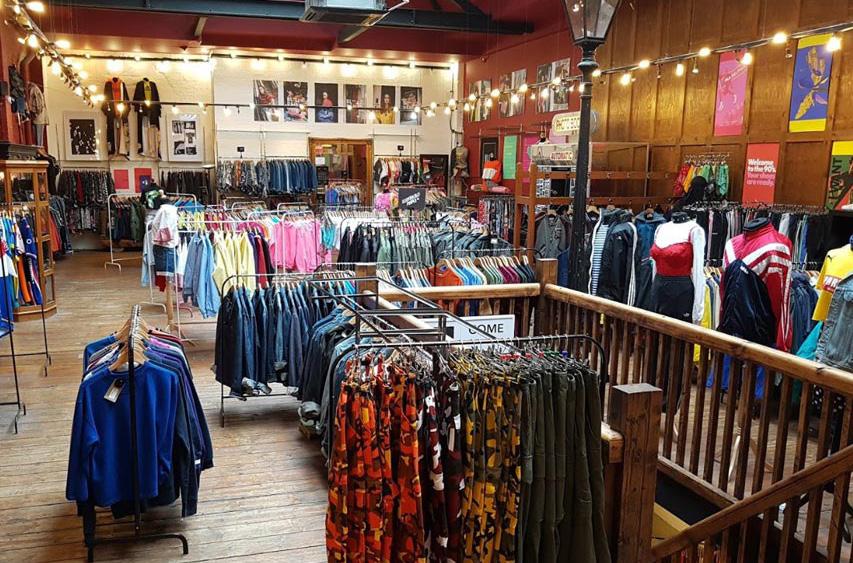
“The government’s ‘side-hustle’ tax is just another addition to the mounting expenses on buyers and sellers of second-hand fashion. It makes one wonder about the future of sustainable fashion both environmentally and financially ”
item, but you are also charged a ‘buyer protection’ fee as well as shipping costs, which are rarely under £2. Therefore, a £5 item on Vinted will roughly cost a buyer up to £9 after fees have been added, making sustainable fashion even more inaccessible for many who cannot afford this. It’s especially ridiculous when these items are being bought out of charity shops and sold on online platforms.
To top it all off, the government has recently introduced the ‘side hustle’ tax (try not to laugh at the name - it’s hard). This tax will affect those with undeclared income if it reaches an earning of £1,000 a year. This means those wanting to participate in sustainable clothing by giving unwanted clothes a new
life are being taxed for their efforts. Instead of taxing the rich in this country (some on over 100k a year!) the government has resorted to taxing individuals who could potentially make a humble £1K annually on Vinted. This adds another layer to the inaccessibility of second-hand fashion, which now sees inflated prices in shops, inflated prices of items online, excess buyer fees and taxes on sellers.
Overall, due to the popularity of thrifting, buying secondhand is becoming a much less viable alternative to fast fashion. Of course, it is ultimately more sustainable than fast fashion, however, we must acknowledge that there are layers to the notso-obvious and not-so-easy choice presented by the Depop Girlies. The government’s ‘side-hustle’ tax is just another addition to the mounting expenses on buyers and sellers of second-hand fashion. It makes one wonder about the future of sustainable fashion both environmentally and financially.

The Africa Cup of Nations (AFCON) 2023 kicked off the new year in January 2024. The football tournament is hosted this year in Ivory Coast. Furthermore, AFCON provides a space for expressing continental African joy in celebration of 54 countries coming together, united by sport.
Since 1957, AFCON has long been an event that draws millions of spectators who passionately support and root for their countries. With this history comes an array of football heritage that shapes African joy as an ontological reality. Africa has been a repeated victim of misrepresentation and reductionist depictions that portray it as a famine-plagued, diseased, and economically decaying continent. Such depictions overlook the rich cultures, arts, and celebrations of the continent’s diverse peoples.
In the online publication Africa is a Country, writer Moradewun Adejunmobi in her story ‘African Joy: Joy in Africa’, asserts pleasure as “one of many facets of African life, and not as a spectacular exception to the norm of African humanity.” African joy is integral to AFCON.
In context, according to the African Federation of Football, the fixture match between Ivory Coast and Nigeria sold out at the Alassane Ouattara Stadium which holds 50,000 spectators. In 2021, AFCON garnered more than 65 million views, according to Business Day. With that said, millions celebrate AFCON with a diverse spectrum of arts, music, and dances that are characteristic of the event.
One cannot forget Freshlyground and Shakira’s “Waka Waka (This Time for Africa)” of the 2010 World Cup. Similarly, Felix Wazekwa’s “Fimbu” is a Congolese Rumba song accompanied by a gleeful dance, packed with colourful enjoyment and happiness. Just the same, Hamada Helal’s song

“Amalooha El Regala”, with its percussionist rhythms became an anthem on the streets of Cairo, Egypt during the North African nation’s three consecutive wins from 2006-2010. This year’s cup’s anthem brings together Ivory Coast’s Magic System, Nigeria’s Yemi Alade, and Egypt’s Mohamed Ramadan in “Akwaba” which asserts Africa’s unity and connection. With its dynamic tunes, the song deeply validates the cheery African identity. The song has already garnered more than six million views on YouTube within one month of its release.
AFCON is an event where Africans come together, no matter where they are from, to celebrate and be happy. It is typical for an African to have a list of other countries that they support in case their country does not make it to the finals. No wonder AFCON is dubbed “the continent’s biggest party” by Maher Mezahi in Africa is a Country.
In addition to sport, food, music, and dance, Africa is often misrepresented, but should not be ignored as a leader on many fronts. According to the World Trade Organization, Africa is a hefty global economic contributor when it comes to metal alloys for automotive and IT products, vaccines, and agricultural commodities. Furthermore, AFCON 2023 is taking place at a time when South Africa sets an example in global political leadership through its case against Israel at the International Court of Justitce.
As the 34th AFCON continues, let us wholly celebrate Africa and remind ourselves of the joy she rightly experiences – with visions devoid of judgement or wrongful redaction of African reality.
AFCON is set to continue until the final match on 11 February 2024.
On the SOAS campus there are many societies that are committed to not only providing a close-knit community space but also an educational insight into the world around us.
Such societies allow students from certain undergraduate or postgraduate degrees to build upon their previous learning and engage, on a personal level, with their own academia. These societies create a space for debating and gaining perspective as they push students to drive their own political ideologies and understand others. One of these societies that provide this community within campus is the World Development Society (Devsoc), which is notably one of the oldest societies on campus.
Amal Abubakar, who is this year’s secretary for the society, explains that Devsoc is dedicated to providing students with “holistic insights into the field of development.” They perceive development as both an academic discipline and a field of work.
The society aims to connect around 1,300 students to
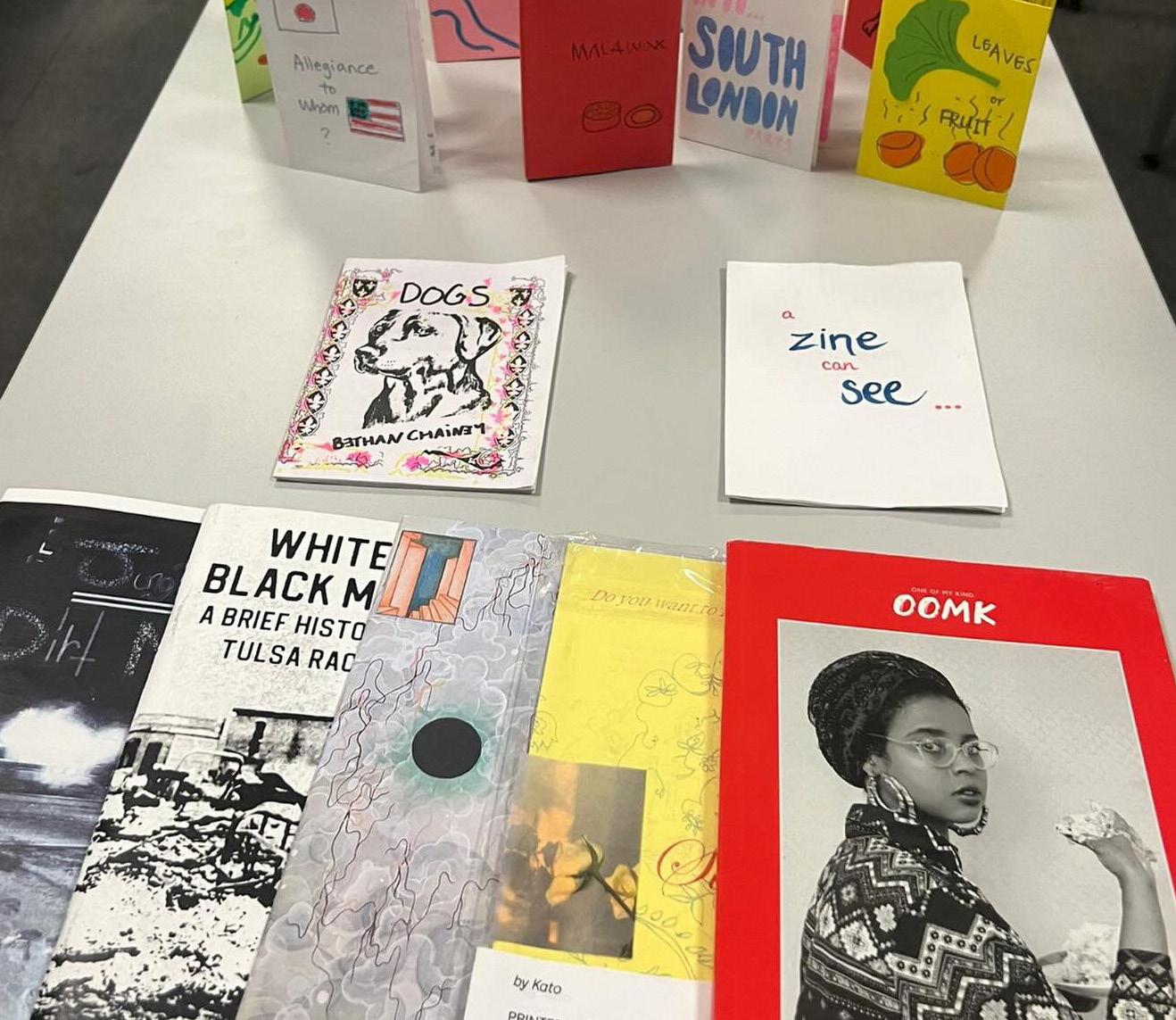
network through platforms such as Instagram, LinkedIn and direct links via WhatsApp groups. Due to the large number of students involved in the society, it can sometimes be difficult to continuously host a multitude of events. From a committee perspective, Amal expresses how Devsoc is dedicated to
hosting at least two events a month in order to push student engagement and keep up with the perpetual changes within world development. These events range from intimate documentary screenings with fellow SOAS filmmakers, which aids to further emphasise this sense of community, to hosting directors from a variety of social enterprises. Another popular event within the society is the organisation of conferences, which pushes students to voice their own personal viewpoints on world development.
Amal states that it is important to have the World Development society, as it provides a representative body within the student campus. The society has created a space for people who are interested in working, researching and learning about the development field and allows them to gain specific knowledge and tips. Devsoc also works closely with the Development department at SOAS. Amal emphasises that anyone on campus is welcome to join the World Development society, regardless of degree or graduate status, and can do so by keeping updated through Instagram @soasworlddev and registering as an official member through the SOAS SU website.
SOAS Pilates Society, the first all-women wellness sports society, has just been formed. The society aims to be a safe, friendly and welcoming space for all women who are striving to be the best version of themselves.
Held twice a week, this series of low-intensity workouts designed for women is made to both strengthen your body and also increase your mental endurance. The impact that physical fitness has on mental health can often be overlooked and in these colder winter months, the thought of braving the elements to participate in a team sport or go for a run is far from appealing.
With more and more studies citing exercise as a stressrelieving and mentally beneficial activity, pilate’s slow-paced 45-minute workout is perfect to calm your nerves. It refreshes your brain and body and allows you to switch off from the outside world.
We felt a need to introduce a light-hearted wellness environment to SOAS and found a glaring gap amongst societies for a safe, relaxed, and of course active place for women to come together. Pilates is the solution!
For years now, pilates has been seen as a fashionable ‘trend’ among young people, and since the pandemic social media has blown it up as ‘the exercise’. However, we don’t see it as a naff TikTok trend. Simone Biles admitted how strenuous it could be even compared to gymnastics and assured her
colleagues it’s something that does a lot more than it appears to. Pilates has well-being at its core, channelling mental endurance through physical strength. Think about it as well-being, rejuvenation and self-care…with a workout mixed in!
Pilates is known for its emphasis on core strength, flexibility and body awareness. The practice combines controlled movements with intentional breathing which overall fosters a healthy mind and body connection. Don’t worry, our classes are focussed on beginners, those who have never done pilates before or have had few classes although there are always adaptations which can facilitate our more experienced individuals. We hold no expectations and welcome anyone who wants to try something new, make friends or just experience our women’s wellness environment.
As students we wanted a hospitable environment to make friends, socialise and build a community together within SOAS. Our choice to make this a women’s only society ensures a calming sense of security, and creates a space to build friendships. At the moment the committee is just two of us (with a bunch of members exercising weekly, of course). We have ensured that everyone is welcome and that we keep a keen eye on maintaining a safe space. We run the social media pages, the contacts, classes and events personally, so you will always be speaking to us directly. The little details are important to us, and that’s why we have chosen to keep our committee so closeknit…don’t worry though, we’ll be expanding soon enough!
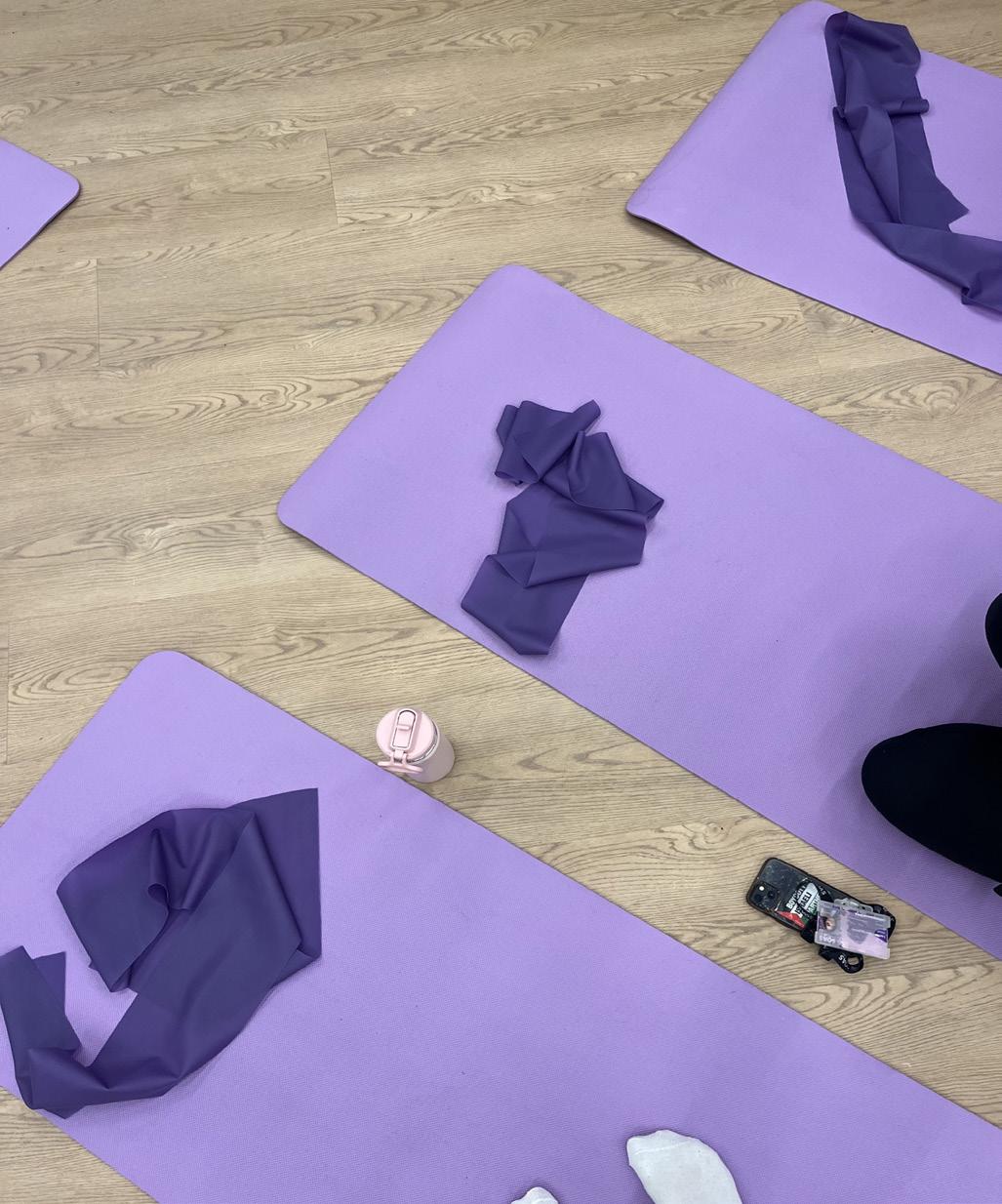
We all see the society as more than just weekly classes and we cannot wait to see many more faces as we grow.
SOAS Pilates Society was founded by Laaibah Chowdrey and Sophia Wheway. Find us on Instagram [@SOASPILATESSOC] and the SU Website.
In this issue, we present to you another society spotlight: the SOAS Writers Society. Although it is only in its second year of operation, the society already has a vibrant and diverse community.
Among SOAS’s many literary societies, you will find the Writers Society. Its inception was motivated by a desire to unite the University’s creative writing community. Given that SOAS is known as a humanities university, it is surprising that there was not a community space for individuals to share and talk about writing. From this idea, the Writers Society came into being and has since become a hub for creative individuals who share a common interest in writing.
“To become involved with the Writers Society and stay up to speed, follow its Instagram page and join its WhatsApp group for future updates.”
So far, the Writers Society has hosted a variety of activities both inside and outside the University buildings. This term alone, they have already held a group visit to the British
Museum’s latest exhibition, Artists Making Books: Poetry to Politics. It will also hold a poetry writing workshop with the Kurdish Society on the theme of Diaspora: A Home Away from Home on January 26th, with the night offering the opportunity to explore Kurdish poetry, develop your own, and perform it during an open mic segment of the event.
The Writers Societys most prominent and significant events are its monthly writing workshops. Each session seeks to explore a particular theme using various writing forms. They held a workshop in October to commemorate Black History Month. In it, they discussed ‘The Black Experience’ and looked at poetry written by prominent black poets such as Maya Angelou. They also arranged a film screening of ‘The Kite Runner’ with the Film Society. There they had a workshop on scriptwriting as well as a discussion of the movie as part of Islamophobia Awareness Month.
The Writers Society has no plans to slow down this semester either. They are already planning numerous events for its members, including Valentine’s Day activities in February, International Women’s Day events in March, and an open mic at the end of the academic year.
The Writers Society is a society within the SOAS community that contributes to the universities’ rich cultural growth. As we look ahead, we hope that the society will continue to be a haven for all of SOAS’ creative minds.
To become involved with the Writers Society and stay up to
speed, follow its Instagram page and join its WhatsApp group for future updates. If you want to see specific activities in the future, please contact the society via Instagram or their official email! (All of this information may be found on their LinkTree, @soaswriterssociety).
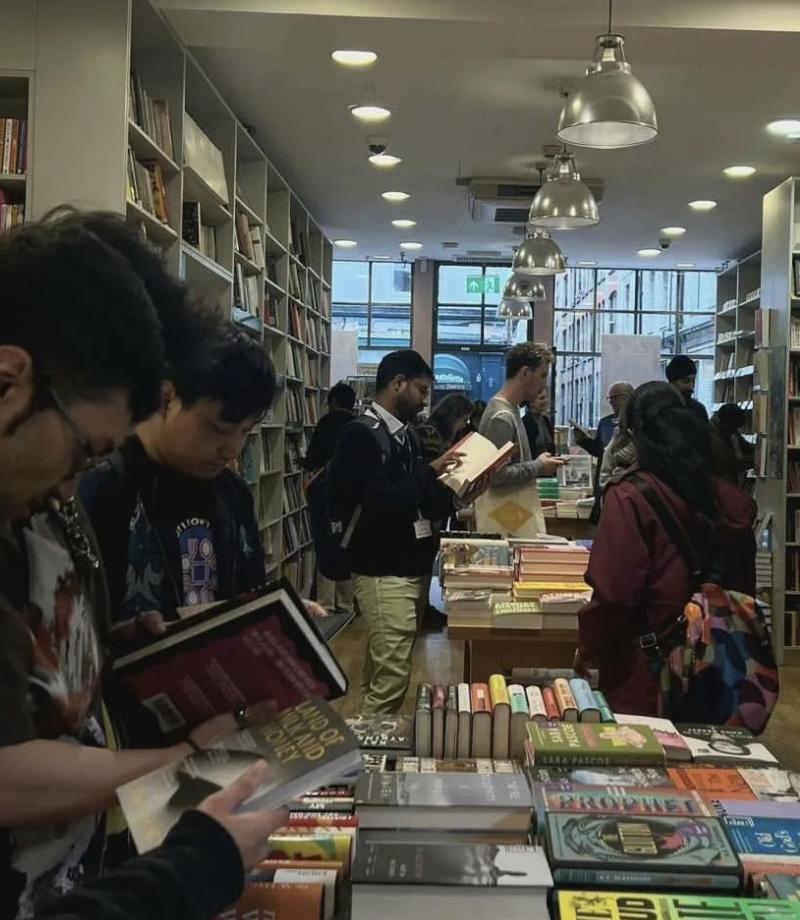
Interested in journalism, writing, design, or photography?
Want to gain valuable experience to pursue a career in the media or publishing?
Want to express your opinions?
